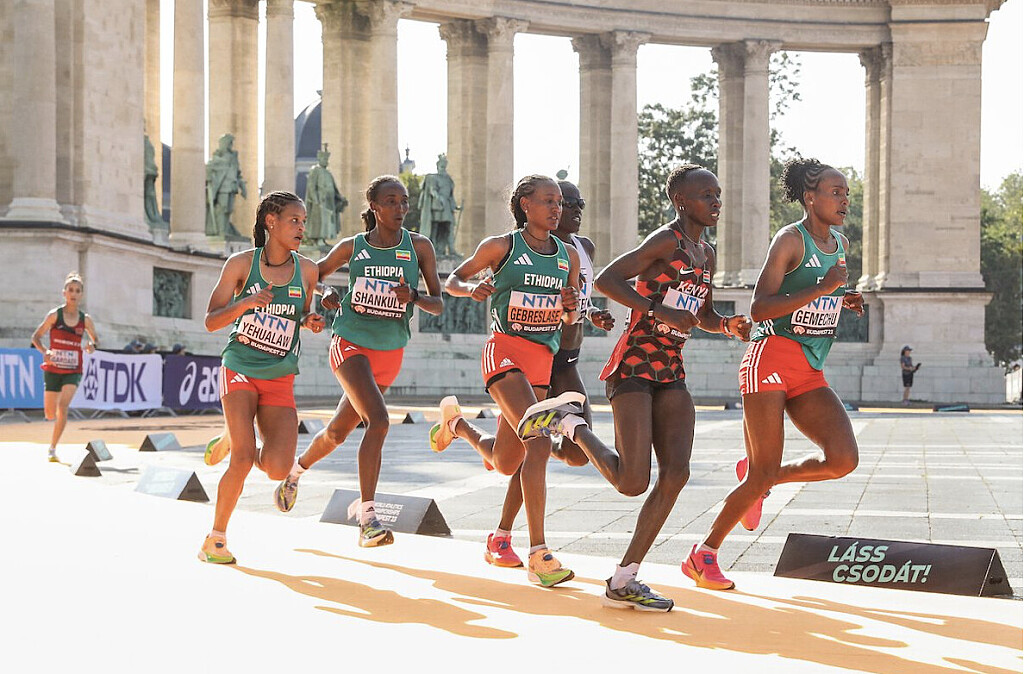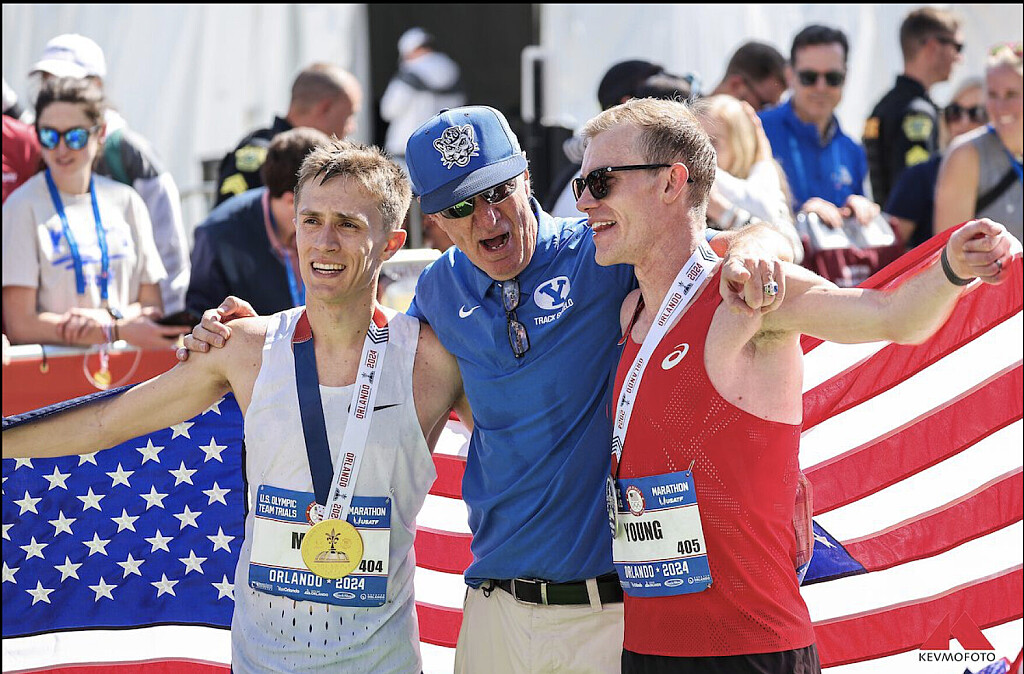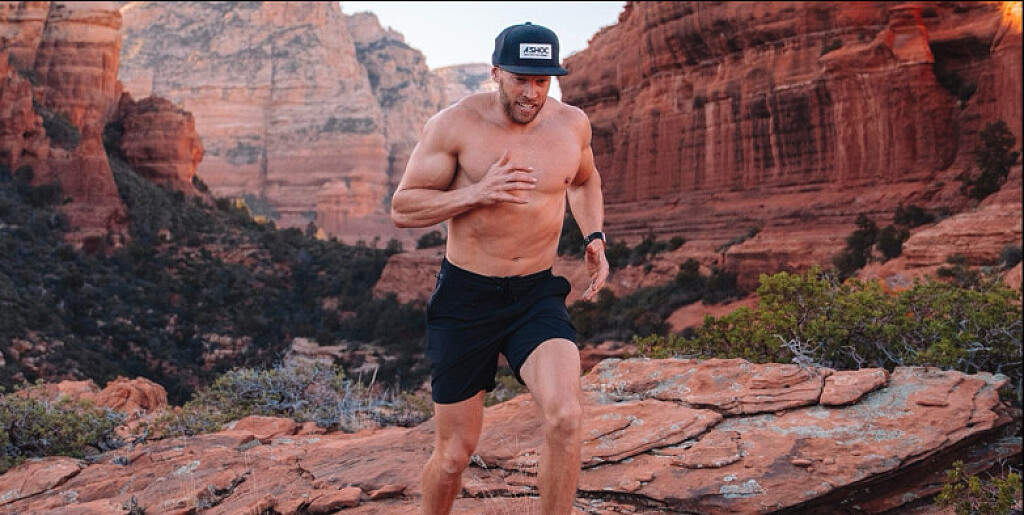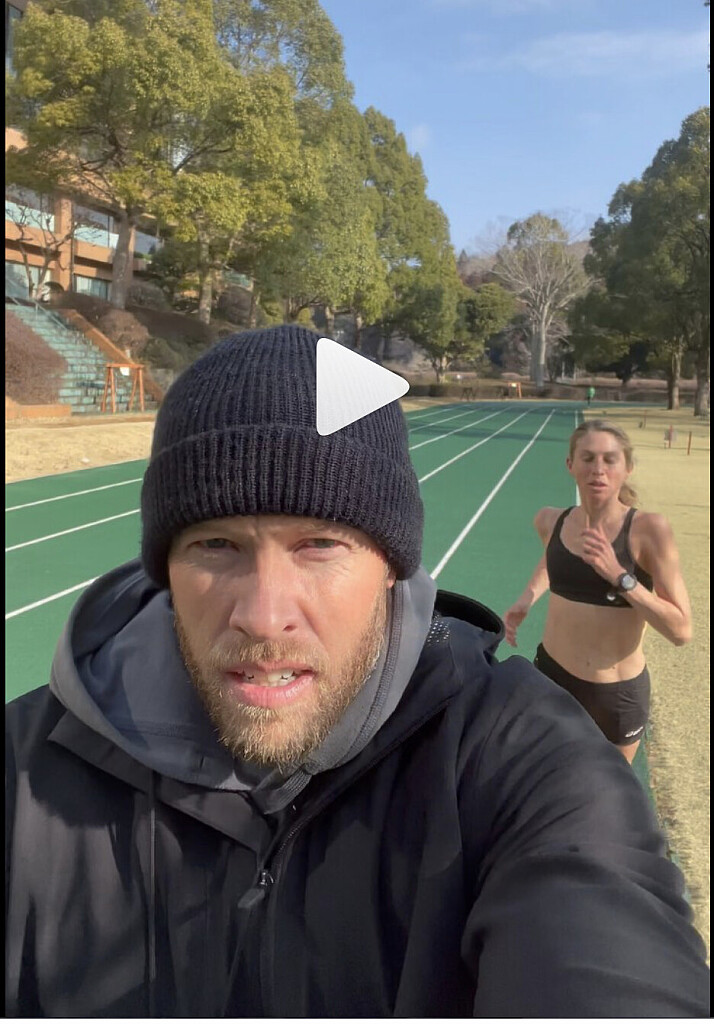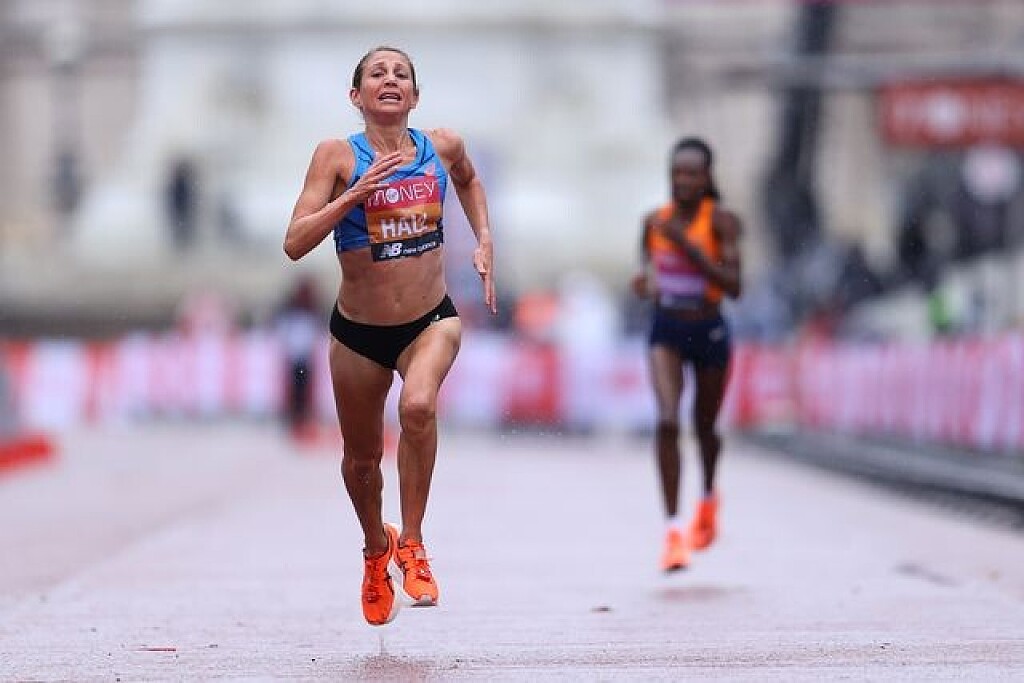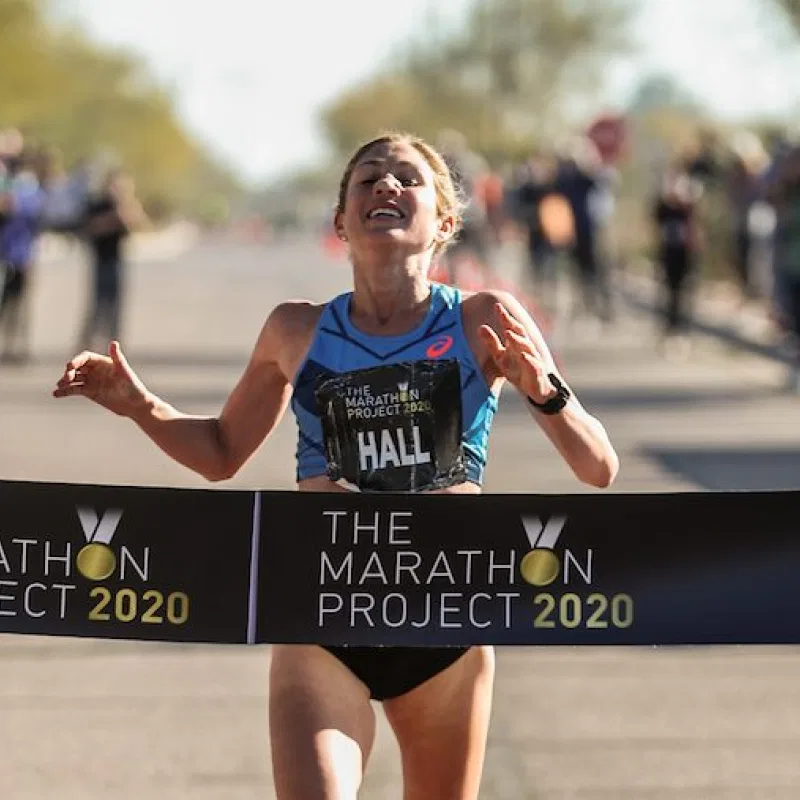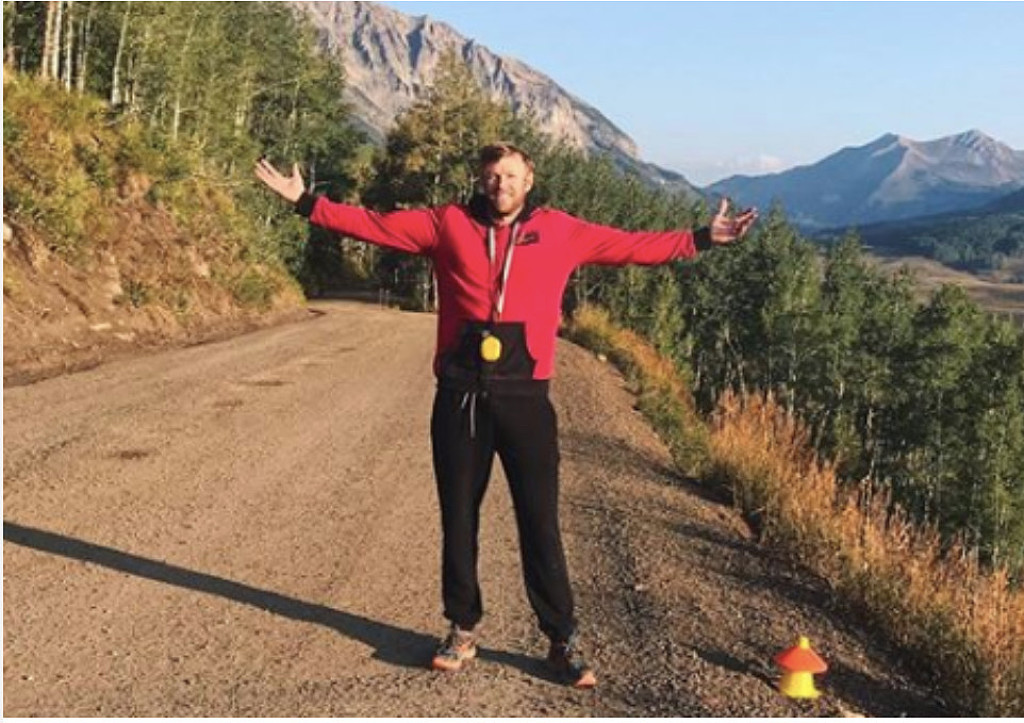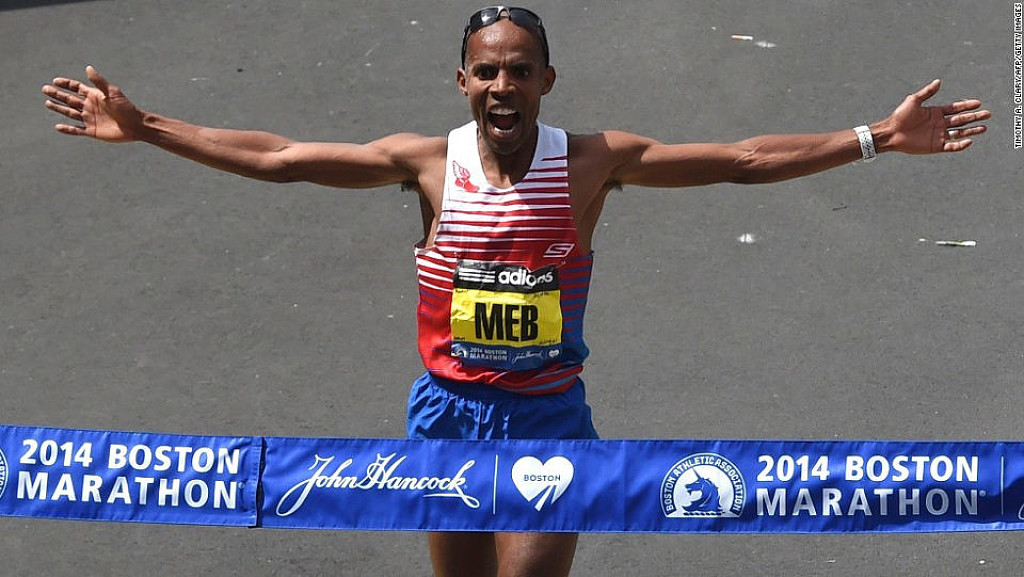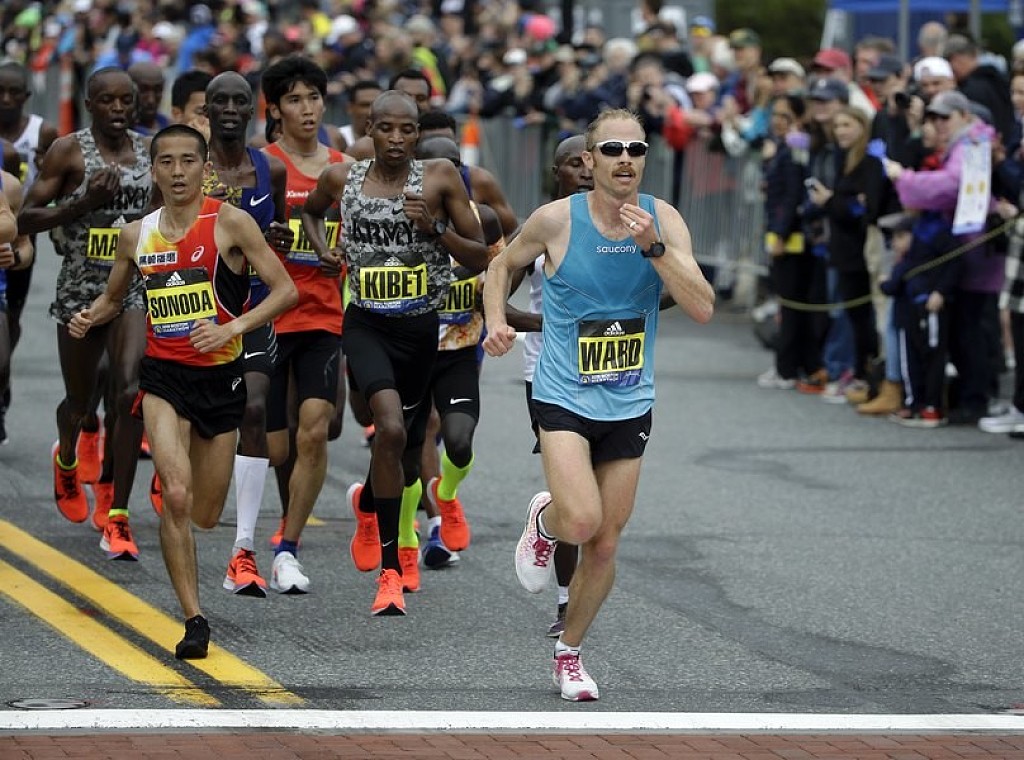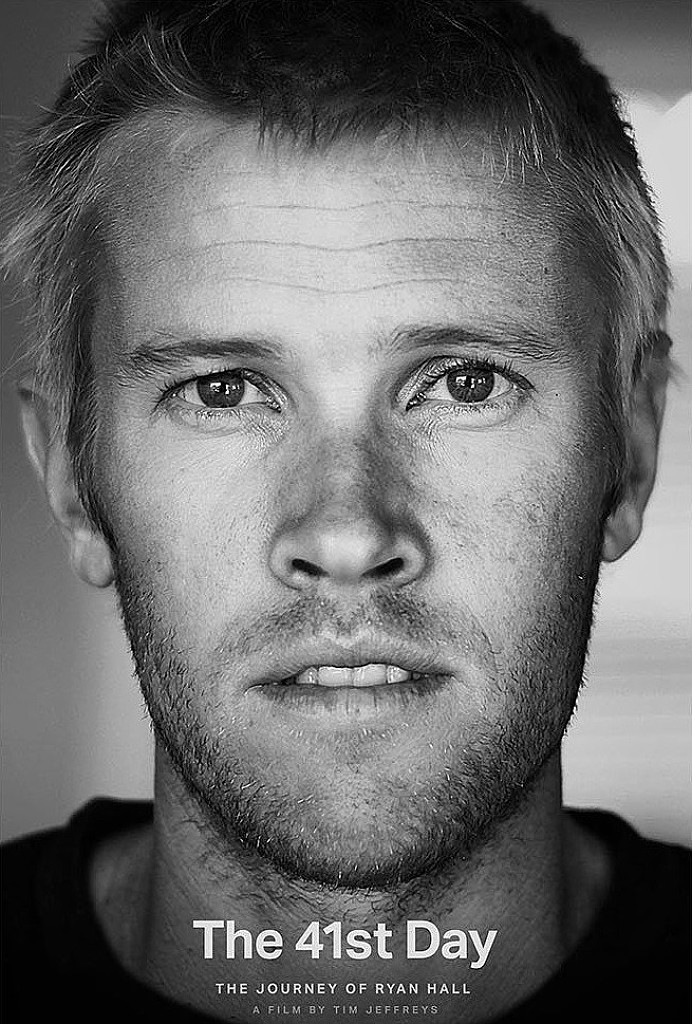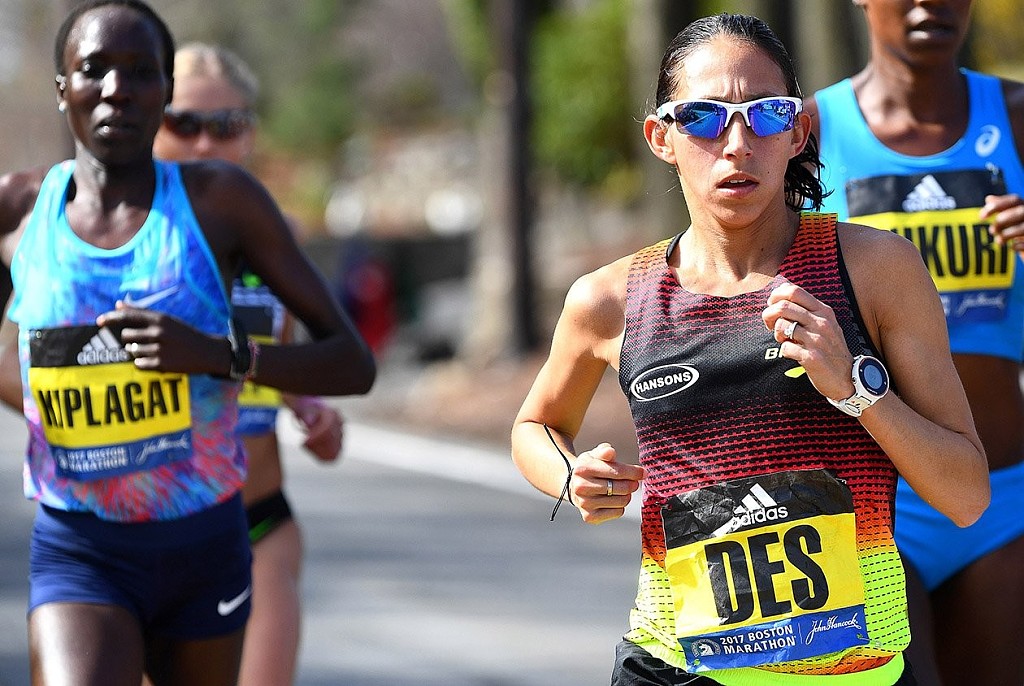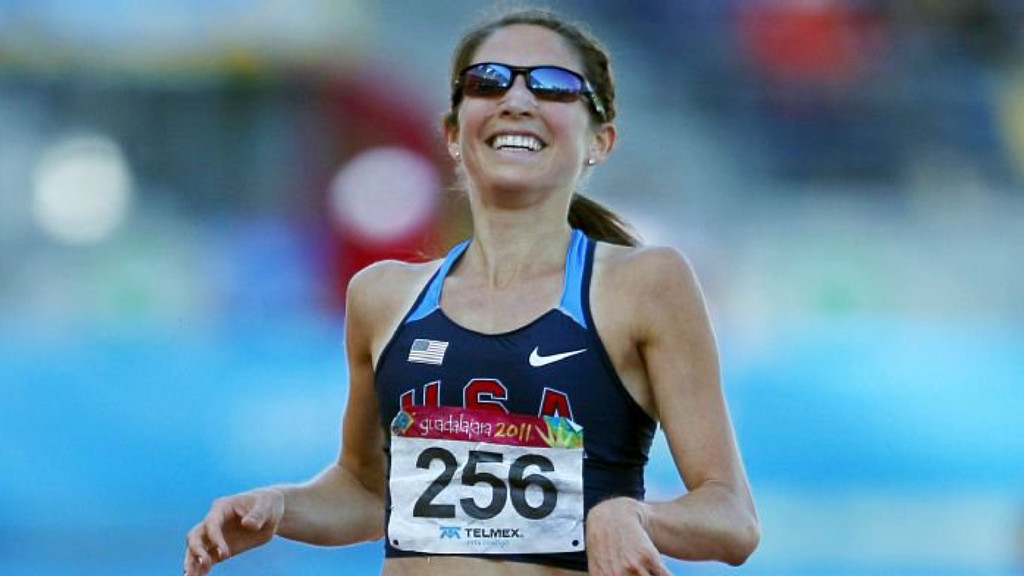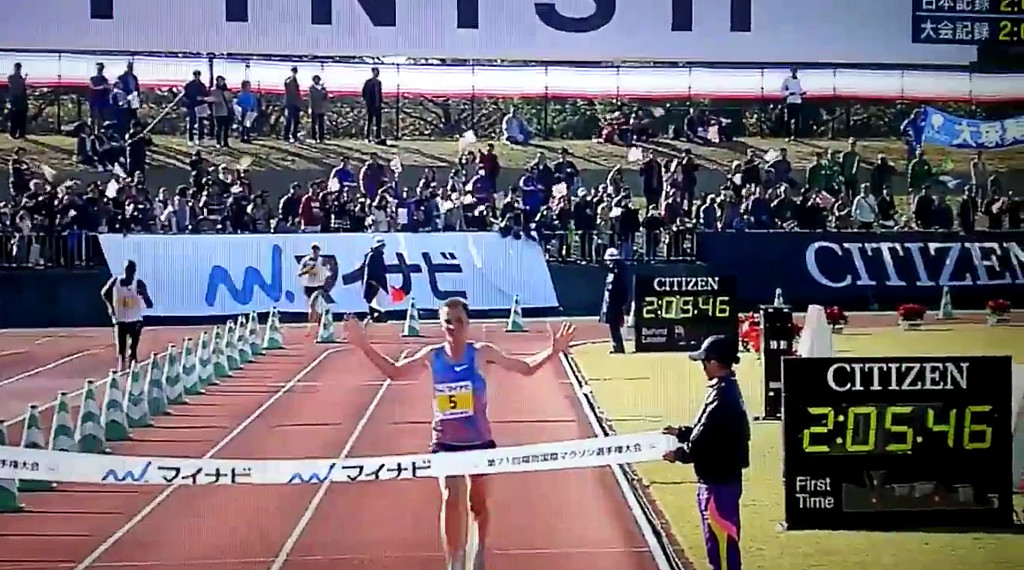Running News Daily
Running News Daily is edited by Bob Anderson in Mountain View, California USA and team in Thika Kenya, La Piedad Mexico, Bend Oregon, Chandler Arizona and Monforte da Beira Portugal. Send your news items to bob@mybestruns.com Advertising opportunities available. Over one million readers and growing. Train the Kenyan Way at KATA Running Retreat Kenya. (Kenyan Athletics Training Academy) in Thika Kenya. Opening in june 2024 KATA Running retreat Portugal. Learn more about Bob Anderson, MBR publisher and KATA director/owner, take a look at A Long Run the movie covering Bob's 50 race challenge.
Index to Daily Posts · Sign Up For Updates · Run The World Feed
Articles tagged #Ryan Hall
Today's Running News
U.S. Olympic Marathoners Will Race the Bolder Boulder 10K as a Pre-Paris Tune-Up
Conner Mantz, Clayton Young, and Leonard Korir will run in the International Pro Team Challenge on May 27.
Memorial Day is always an exceptional celebration for runners in Boulder, Colorado, but this year, it will have some extra special Olympic flair.
On Monday, May 27, more than 40,000 runners will run through the city that’s known for the iconic Flatirons rock formations, the Pearl Street pedestrian mall, and an exceptionally active population in the annual Bolder Boulder 10K. Now in its 44th year, it’s been one of the top road running races in the U.S. since its inception, and this year will serve as one of the final tune-ups for the men’s U.S. Olympic marathon squad before racing in the Paris Olympics later this summer.

Conner Mantz, Clayton Young, and Leonard Korir, the top three finishers in the 2024 U.S. Olympic Trials who will be racing the marathon in the Paris Olympics on August 10, will be competing as Team USA Red in the Bolder Boulder’s International Pro Team Challenge that follows the citizen’s races. (Korir is expected to officially be named to the U.S. team in early May based on final pre-Olympic international rankings.)
The pro race, which has a prize purse of $83,700 before potential bonuses, is one of the things that makes the Bolder Boulder so unique. After all the runners in 98 citizen waves have completed the race, professional men’s and women’s international teams from more than a dozen countries compete on the same course for team and individual titles. The races feature a staggered start, with women beginning 15 minutes before the men so the winners of each race will finish about 10 minutes apart inside the University of Colorado’s Folsom Field football stadium.

The finishing moments are among the thrilling spectacles in American running. By that point, the stadium is filled with a near-capacity crowd of roaring runners, family, and friends who have been watching the action play out on the massive video screens.
“The finish in the full stadium is like nothing else in the sport,” says Mantz, 27, who won the men’s race last year in 29:08 with a thrilling late-race surge to pass Kenya’s Alex Masai in the final 200 meters before the finish. “It was pretty electric. It took away all the pain you’re feeling mid-race. I was like, ‘Just race as hard as you can.’”
Team USA Red will have plenty of competition, from Team USA White, the secondary American team of Jared Ward, Futsum Zienasellassie, and Sam Chelanga, as well as teams from Kenya, Ethiopia, Mexico, and Rwanda. Teams are scored like a cross country race, with points awarded on the basis of finishing place, which means the team with the lowest combined score for all three runners is the winner. Ties are decided by the positions of the third-place finishers.
The women’s Team USA Red team will be led by defending champion Emily Durgin, along with Sara Hall and Boulder native Nell Rojas. Durgin finished ninth at the U.S. Olympic Trials in February and won the USATF 10 Mile Championships on April 7 in Washington D.C. At last year’s Bolder Boulder, she stormed to victory in 33:24, winning by 24 seconds over Kenya’s Daisy Kimeli.
Hall placed fifth in the U.S. Olympic Trials Marathon on February 3 in a U.S. master’s record (2:26:06) and 15th in the Boston Marathon on April 15. The women’s Team USA White roster will be composed of an all-University of Colorado alumnae squad—Makena Morley, Sara Vaughn, and Carrie Verdon.
“I can’t wait to be back in Boulder for the best day of the year,” says Durgin, 29, who will compete in the U.S. Olympic Trials 10,000 meters on the track in late June with the hopes of making the U.S. Olympic team. “Competing with Nell and Sara will make the experience even better.”
The women’s U.S. Olympic marathon team of Fionna O’Keefe, Emily Sisson, and Dakotah Lindwurm were invited to race in the Bolder Boulder but each runner declined, citing scheduling timing conflicts or a disinterest in racing at Boulder’s lofty altitude (5,430 feet). All of the runners who are racing for the U.S. teams in Boulder live at 4,500 feet or higher.
An Olympic Legacy
Boulder is known as one of the top running meccas in the U.S., in part because elite-level American and international runners have made it their training base since Olympic gold medalist Frank Shorter arrived in the early 1970s. Emma Coburn, Jenny Simpson, Yared Nuguse, Joe Klecker, Jake Riley, Hellen Obiri, and Edna Kiplagat are among the many top-level runners who are currently training in Boulder. Shorter, the 1972 marathon gold medalist, was a co-founder of Bolder Boulder 10K in 1979, and helped it grow into one of the country’s largest races.
Since then, numerous U.S. Olympians have raced in the Bolder Boulder, including Deena Kastor (a three-time women’s champion), Aliphine Tuliamuk (the 2022 women’s winner), Alan Culpepper, Elva Dyer, Ryan Hall, Abdi Abdirahman, Jorge Torres, Shalane Flanagan, Amy Cragg, Magdalena Boulet, and Libby Hickman, as well as Korir (who won it in 2022), and Ward (who was fourth in 2022).
Thanks to Boulder’s robust running community and the prestige of the race, the Bolder Boulder has also always featured fast sub-elite runners competing in the early citizen waves. Yet, the race has also celebrated dedicated middle-of-the-pack runners, as well as the first-time runners and walkers in the later waves. It was one of the first races to have bands playing along the course (as well as belly dancers and other entertainers), runners dressed up in costumes, elite wheelchair races, and in recent years, it has been known for a mid-race slip-and-slide and unofficial bacon aid station.
For the past 25 years, the Bolder Boulder has organized a special Memorial Day tribute—one of the largest in the country—that honors military veterans and new cadets.
The U.S. men’s Olympic marathon team competing in this year’s Bolder Boulder will be a legacy moment for the race, says Bolder Boulder race director Cliff Bosley.
“Having the three men that will represent our country in the marathon at this summer’s Paris Olympic Games is something we are extremely proud of,” Bosley says. “All three ran here last year, and to have them back is just incredible for the race, the city of Boulder, and the sport of running.”
(05/08/2024) Views: 96 ⚡AMPby Brian Metzler
World Athletics to raise marathon standards for 2025 World Championships
The men's standard is expected to go up to 2:06:30, and the women's standard will be 2:23:30
On Tuesday, the marathon entry standards for the 2025 World Athletics Championships in Tokyo were leaked to social media, and the men’s and women’s marathon qualification marks seem to be getting a lot tougher.


The women’s marathon entry standard is expected to be increased by three minutes and 20 seconds, to 2:23:30, from the previous 2:26:50 mark for the Paris Olympics. With the number of female athletes recording sub-2:20 times, most expected to see an increase in the women’s standard.
The men’s marathon standard is expected to see an increase of one minute and 40 seconds, to 2:06:30, from its previous mark of 2:08:10. Only 91 athletes have hit this new mark in the Paris Olympic qualifying window (November 1, 2022 to April 30, 2024). Sixty-five of those 91 athletes are Kenyan and Ethiopian.When the women’s marathon entry standard was released for the Paris Olympics, World Athletics intended for a near 50/50 split in runners hitting the entry standard and the rest of the field qualifying via the World Athletics rankings and points system. The number of women who will qualify on points for the Paris Olympics will be zero, with 82 women of the (soft cap) of 80 spots hitting the Olympic standard of 2:26:50.The new standard of 2:23:30 is a mark only two Canadian female marathoners have surpassed (Natasha Wodak’s Canadian record of 2:23:12 from the 2022 Berlin Marathon and Malindi Elmore’s 2:23:30 from Berlin in 2023). One hundred and fifteen female athletes have run under this mark in the Paris Olympic qualifying window, with the top mark being Tigist Assefa’s world record of 2:11:53 in Berlin. Even though Elmore’s mark equalled the Tokyo WC qualifying mark in September 2023, her time will not get her into the 2025 World Championship marathon, since the qualifying window did not open until November.
Only four North American men have ever run under the proposed 2025 World Championship standard: Canada’s Cam Levins (2:05:35–Tokyo 2023) and three Americans: Khalid Khannouchi (2:05:38–London 2002), Galen Rupp (2:06:07–Prague 2018) and Ryan Hall (2:06:17–London 2008).World Athletics’ tougher standards come with the organization’s goal to create a dual pathway of qualification, with 50 per cent of athletes qualifying through entry standards and the remaining 50 per cent qualifying through World Rankings and its points system.
(03/23/2024) Views: 153 ⚡AMP
by Running magazine
Meet the marathon guru behind three of North America's top runners
It’s been an exciting start to the year for Brigham Young University (BYU) cross-country and track head coach Ed Eyestone. In February, three athletes who once ran for Eyestone at BYU qualified for the Paris Olympics in the men’s marathon, including Canada’s Rory Linkletter, who hit the Olympic standard at last weekend’s Sevilla Marathon, running a two-minute-plus personal best of 2:08:01.
Eyestone, who coached Linkletter for five years at BYU before Linkletter turned pro (he is now coached by former U.S. marathoner Ryan Hall), knew he was ready for a breakout performance after watching Linkletter execute a top-20 finish in the marathon at the 2023 World Championships in Budapest. “I was super excited for him, and told him he was next, after the U.S. marathon trials,” says Eyestone. “To see him execute on race day, and run a fast time, I was proud of him.”

“It turns out that the group of 10K runners we had in 2018 was special,” laughs Eyestone. Linkletter ran for BYU in Provo, Utah, from 2015 to 2019, and just happened to be a part of a special group of young runners who would turn out to be three of North America’s top marathoners. U.S. Olympic Marathon Trials champion Conner Mantz and second-place finisher Clayton Young also ran at BYU during this time; they helped lead the Cougars XC team to three top-three finishes and an NCAA championship title in 2019.
“Looking back on that 2018 team, we were second and now have three men who’ve run faster than 2:08:10… if only the NCAA’s was 26.2 miles,” Eyestone laughs.
“Every high school athlete we recruit has aspirations of running professionally or being an Olympian one day,” he says. “I know with Mantz, he was heavily recruited out of high school, and he wanted to go to a school that would one day prepare him for the marathon.”
Eyestone’s coaching philosophy for developing long-distance athletes is not rocket science. He believes in long-term progression, so his athletes aren’t maxing out in college, and are leaving the window open for higher mileage post-collegiately. “I’ll have my 5,000m and 10,000m guys run around 80 miles a week, with a long run of 90 minutes,” he says. Eyestone has continued to coach Mantz and Young at the professional level, and still swears by not having them do much over two-hour long runs. “We have a great program at BYU, and it’s not unusual for Mantz and Young to hop in and work out with the college kids.”
BYU is an altitude school, standing at 1,400 metres above sea level, and has a large recruiting pool and an extensive following, with its affiliation with the Church of Jesus Christ of Latter-day Saints.
When Eyestone arrived as a coach at BYU in 2000, his goal was to build a culture to become a powerhouse program in the NCAA. “We wanted to recruit guys who wanted to challenge for an NCAA XC podium spot every year,” he says. “It all starts at the beginning of the year, with the team’s veterans setting the tone and getting younger athletes and recruits to buy in.”
Despite Linkletter choosing to part ways with Eyestone as his coach in 2019, the two remain close friends and share a level of respect for one another. “Rory is an incredible leader; he was our team captain,” says Eyestone. “He would always hold the team accountable for showing up on time and developing a healthy routine […] I remember he called it Ferrari fuel.”
Eyestone’s favourite thing about being a coach is being able to see the ripple effect of a good performance or win on an athlete’s family and personal life. “My son-in-law told me on Sunday after Rory’s race that four percent of the athletes in the men’s marathon in Paris will be former BYU runners,” Eyestone revealed. “I couldn’t be more proud of them.”
(02/24/2024) Views: 220 ⚡AMPRory Linkletter to chase Olympic marathon standard in Spain
After a short and successful stint on the indoor track to end 2023, Canadian marathoner Rory Linkletter has announced his next race, the Sevilla Marathon on Feb. 18. Linkletter’s goal is to run a personal best and book his ticket to the Paris Olympics, which will require a time of 2:08:10.
“I will be heading to Spain to run the Sevilla Marathon on Feb. 18,” Linkletter wrote on Instagram. His reasoning for choosing to race in Sevilla was to give himself ample time to recover and prepare after his 18th-place finish in the marathon at the 2023 World Athletics Championships in late August.
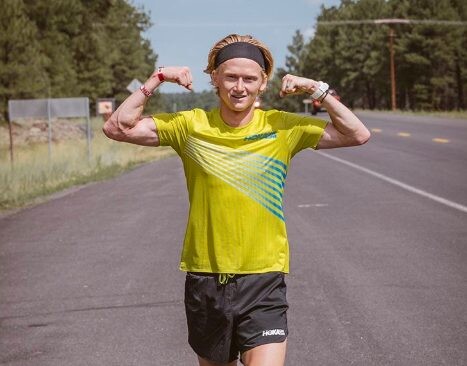
Although Linkletter’s time of 2:12:16 in Budapest was shy of his personal best, he referred to the race as the smartest he’s ever run, passing over 20 runners in the final 15 kilometers.
In Sevilla, Linkletter will be vying for the fastest time of his career, and he will need to hit the men’s Olympic A standard of 2:08:10. If he misses the standard, he can still be selected for Team Canada via the World Athletics rankings. He has a personal best of 2:10:24 from the 2022 World Championships in Eugene, Ore.
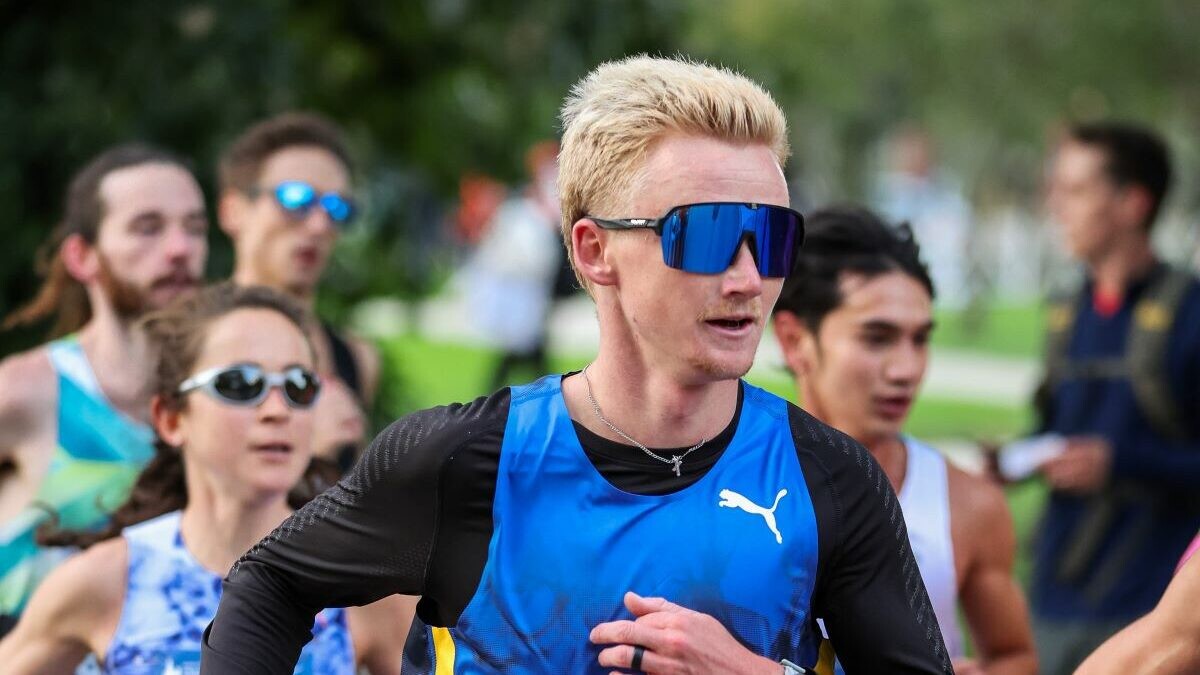
“Training is going well, and I want to set myself up well for an Olympic Standard attempt (2:08:10),” Linkletter said.
The 27-year-old had the second-fastest Canadian men’s marathon time in 2023, behind only Cam Levins’s 2:05:36 in Tokyo. Levins already has one of the three eligible marathon spots for the Canadian men’s Olympic team, but with five months left to qualify, two spots are up for grabs for Canadians who meet the Olympic B standard of 2:11:30.
If Linkletter were to hit the A or B standard, he would potentially be selected for his first Olympic Games.
The Canadian-born marathoner, who lives in Flagstaff, Ariz., has been working on his speed over the last few months with his coach, former U.S. marathoner Ryan Hall, to improve his speed. In early December, he became the 74th Canadian to run a sub-four-minute mile and only the second Canadian to accomplish the feat while also being a sub-2:12 marathoner.
He joined marathon record holder Levins as the only other Canadian to do so.
(01/04/2024) Views: 289 ⚡AMPby Marley Dickinson
Zurich Marathon Sevilla
This urban, flat, fast and beautiful brand new race course will drive athletes through the most beautiful monuments of the city. Zurich Maraton de Sevilla brings the unique opportunity to brake the Best personal result over the mythical distance to all the athletes, professional or age groupers, in one of the most perfect international marathon circuits. This fast marathon takes...
more...Elite women's marathoner Hall to run Manchester Road Race
Sara Hall, who was fifth in the World Marathon Championships last year, has entered this year's Manchester Road Race. This will be her first appearance in the Thanksgiving Day run.
Hall, 40, finished in 2:22:10 in the world event in Eugene, Oregon, and was the runner-up at the 2020 London Marathon in 2:22:01. Her personal-best for the 26.2-mile run 2:20:32, and 1:07:15.

A seven-time All-American when she competed for Stanford, Hall ran the steeplechase before becoming a marathoner. She won the gold medal in the steeplechase at the 2011 Pan American Games in Mexico.
Hall is married to retired Olympic marathoner Ryan Hall. Ryan, who also competed for Stanford, set the United States records for the marathon and half marathon. In 2017, the couple adopted four young sisters from Ethiopia. The family resides in Flagstaff, Arizona.

“Sara is a wonderful addition to this year’s race,” said Jim Harvey, the MRRs elite runner coordinator. “She is a very accomplished athlete and a great person.”
The 87th Manchester Road Race, which has been designated a World Athletics Label Event by World Athletics, starts at 10 a.m. on Thanksgiving Day Nov. 23. The 4.748-mile-long road race is run on a loop course through Manchester’s central district that starts and finishes on Main Street, in front of St. James Church.
(10/19/2023) Views: 448 ⚡AMPManchester Road Race
The Manchester Road race is one of New England’s oldest and most popular road races. The 86th Manchester Road Race will be held on Thanksgiving Day. It starts and finishes on Main Street, in front of St. James Church. The Connecticut Sports Writers’ Alliance recently honored the Manchester Road Race. The CSWA, which is comprised of sports journalists and broadcasters...
more...Scott Fauble Is Aiming for the Olympic Standard at Berlin Marathon
Fauble will hope to become first American man to hit 2:08:10 Olympic standard in Sunday’s race
Scott Fauble was not planning on running a fall marathon in 2023. On April 17, he finished 7th at the Boston Marathon to earn top American honors — just as he did in Boston and New York in 2022. His time of 2:09:44 represented the fourth sub-2:10 of his career, making him just the seventh American to accomplish that feat after Ryan Hall, Galen Rupp, Meb Keflezighi, Khalid Khannouchi, Alberto Salazar, and Mbarak Hussein. In previous years, a top-10 finish at a World Marathon Major counted as an automatic qualifying standard for the Olympic marathon; Fauble, with three straight top-10 finishes on his resume, figured he was in good position for Paris and could shift his focus to the US Olympic Trials in February 2024.

But the Olympic qualifying system for 2024 is far more complicated than in previous years, with ever-shifting world rankings and things like “quota reallocation places” creating confusion among fans and athletes alike. Any athlete ranked in the top 65 of the filtered “Road to Paris” list on January 30, 2024, is considered qualified…except the “Road to Paris” list does not currently exist. After Boston, Fauble, who is currently ranked 122nd* — that’s in the world rankings, which is a different list than “Road to Paris” — tried to take a closer look at where he stood, creating spreadsheets and projecting where he might rank after accounting for time qualifiers, the three-athlete-per-country limit, and potential changes after the 2023 fall marathon season. After a while, his brain began to hurt.
“I felt like the Pepe Silvia meme from It’s Always Sunny in Philadelphia,” Fauble said. “…It was like, this is complicated and stressful and I can just get the standard. This doesn’t need to be an issue.”

That is why Fauble, begrudgingly, made the decision to run the Berlin Marathon. He was not initially looking forward to the race, but with a strong training block in Boulder behind him and the race just four days away, he has changed his tune.
“I’m very excited,” Fauble said. “I wasn’t planning on doing a fall marathon after Boston and I had to figure out ways to get excited for it and I think that’s one of the things that has fired me up, actually seeing how fast I can go and pushing for a PR as opposed to letting the race play out and seeing what I can do.”
Chasing a time is a dramatically different approach to Fauble’s typical marathon M.O. Of the nine marathons he has run, only two have featured pacemakers: his debut in Frankfurt in 2017, and the Marathon Project in 2020. When Fauble runs Boston and New York, the hilly courses where he has found the greatest success, he does not enter with a goal time in mind. Instead, Fauble will wait until the race begins and assess a number of factors — the weather, how he’s feeling, how fast the other runners are going — before deciding which pace to run. Typically, that has led to Fauble letting the leaders go early and picking off stragglers as they fade over the second half of the race.
Berlin will be different. There are no hills to account for, and while Fauble will still fight for every place, he is not hiding the fact that the primary goal of this race is to hit a time. Specifically, the Olympic standard of 2:08:10. Only five Americans have ever bettered that time in history, but Fauble, who ran his personal best of 2:08:52 in Boston in 2022, believes he is capable of doing it.
“I don’t think that me running in the 2:07s is a huge stretch of the imagination,” said Fauble, who has removed some of the hillier routes from his training under coach Joe Bosshard but has otherwise prepared similarly for Berlin as he would Boston or New York. “I think I’ve been in that kind of shape a bunch of times.”
Every American marathoner will be rooting for Fauble
Currently, no male American marathoner has earned the 2024 Olympic standard — either by hitting the time standard of 2:08:10 or by finishing in the top five of a Platinum Label Marathon (which includes Berlin). It’s pvery likely someone such as Fauble or Conner Mantz will be ranked in the top 65 of the “Road to Paris” list at the end of January, but with the Olympic Trials less than five months away, US marathoners are getting antsy.
American pros rarely run the Berlin Marathon, typically opting for Chicago or New York in the fall — both of which pay much bigger appearance fees to American runners. But this fall, many are bypassing New York because of the date (just 13 weeks before the Trials) and the course (too slow for a shot at the Olympic standard). A sizeable crew, led by Mantz and Galen Rupp, will be in Chicago, while a far larger number than usual have opted for Berlin.
Berlin’s course is just as fast as Chicago’s, if not faster. It’s also two weeks before Chicago — an extra two weeks to prepare for the Trials — and the weather is typically a little better in Berlin than Chicago. That’s why Keira D’Amato opted for Berlin over Chicago for her American record attempt last year. It’s also why 60:02 half marathoner Teshome Mekonen — another American targeting the Olympic standard this fall — chose Berlin over Chicago.
In addition to Fauble and Mekonen, the 2023 Berlin field also includes 2016 Olympian Jared Ward, 2021 Olympian Jake Riley, and Tyler Pennel, who has finished 5th and 11th at the last two Olympic Marathon Trials. All of them will be looking to run fast. And every other American marathoner will be hoping they do the same.
That’s because of a new provision in the Olympic qualification system which states that any country with three qualified athletes may choose to send any three athletes it wants to Paris — as long as they have run at least 2:11:30 (men) or 2:29:30 (women) within the qualifying window. That’s why every American will be rooting for Fauble and others to run fast this fall: if the US has three athletes with the standard, then anyone who has run under 2:11:30 has the opportunity to make the team by finishing in the top three at the Trials.
The above provision, which World Athletics is referring to as “quota reallocation” means that someone such as Fauble could run the Olympic standard and open up a spot in Paris for an American athlete who ends up beating him at the Trials — thus taking a spot that would not otherwise be available had Fauble not run the standard. Fauble, obviously, is hoping such a scenario does not come to pass. But he is aware of the possibility and has accepted it as part of his reality.
“I don’t mind it,” Fauble said. “Sports have never really been about identifying the best team or the best athlete. They’re an entertainment product and they overemphasize very specific days on the calendar. Even if I was the only one with the standard and I get beat at the Trials, the 73-9 Warriors didn’t win the NBA title that year. You’ve gotta do it on the big days. That’s what being a professional athlete is about.”
(09/21/2023) Views: 444 ⚡AMPby Jonathan Gault
BMW Berlin Marathon
The story of the BERLIN-MARATHON is a story of the development of road running. When the first BERLIN-MARATHON was started on 13th October 1974 on a minor road next to the stadium of the organisers‘ club SC Charlottenburg Berlin 286 athletes had entered. The first winners were runners from Berlin: Günter Hallas (2:44:53), who still runs the BERLIN-MARATHON today, and...
more...Cam Levins becomes the first Canadian runner to break 2:06, running to a fifth-place finish in Tokyo
On Sunday morning in Tokyo, Cam Levins of Campbell River, B.C., solidified himself as the fastest marathoner in North American history at the 2023 Tokyo Marathon, placing fifth in 2:05:36 to shatter his previous Canadian record of 2:07:09 and breaking the long-standing North American record of 2:05:38.
The 33-year-old marathoner has put Canadian distance running on the map, once again, nearly winning the Tokyo Marathon. Levins ran the perfect race, staying patient early on and making all the right moves to contend for the victory.

With one kilometre to go, Levins was in a group of five runners vying for the win, but Ethiopia’s Deso Gelmisa sprinted away with 400m left, winning the 2023 Tokyo Marathon.

It was an Ethiopian sweep of the podium in Tokyo, with Gelmisa taking the win in his first Abbott World Marathon Major, in 2:05:22. His compatriot, Mohamed Esa, finished one second back for second, and Tsegaye Getachew was third (2:05:25).
Levins said, going into the race, that he was shooting for a time of 2:05 after his spectacular half-marathon record run of 60:18 in early February.
His time of 2:05:36 (pending ratification), breaks U.S. marathoner Khalid Khannouchi’s North American record of 2:05:38 from the 2002 Tokyo Marathon. American Ryan Hall is the only athlete to run faster than Levins, 2:04:58 at the 2011 Boston Marathon (though Boston is considered non-record-eligible by World Athletics since it is a net downhill, point-to-point course).
Cam Levins now has four of the six fastest Canadian marathon times in history.
In potentially her last major marathon, Canada’sKrista DuChene ran her fastest time in four years, clocking 2:38:53 for 19th overall. The last time DuChene, 46, broke the 2:40 mark was at the 2019 Berlin Marathon, where she ran 2:32:27.
(03/04/2023) Views: 763 ⚡AMPby Running Magazine
Tokyo Marathon
The Tokyo Marathon is an annual marathon sporting event in Tokyo, the capital of Japan. It is an IAAF Gold Label marathon and one of the six World Marathon Majors. Sponsored by Tokyo Metro, the Tokyo Marathon is an annual event in Tokyo, the capital of Japan. It is an IAAF Gold Label marathon and one of the six World...
more...Runners: you’re probably not eating enough protein
If you’re a runner or live an active lifestyle, you’re probably underestimating how much protein you need. Registered dietician and author Pamela Nisevich Bede touts the importance of staying on top of your protein needs and intake in her book Fuel the Fire.
Olympian and half-marathon record holder Ryan Hall has said “I wish I would have eaten more protein. I bought into the whole ‘your body can only absorb twenty grams of protein in one sitting line and wasn’t recovering optimally.” After Hall began working with a nutritionist, he discovered he was deficient in protein, and adjusted his intake: a few months later, Hall ran his best marathon ever.
“Your best bet is to consume a variety of proteins from animal and plant sources throughout the day,” Bede says. She offers some suggestions on how to dial up your protein intake and improve your performance and recovery.

Protein
Proteins are formed on building blocks called amino acids, and they are essential in keeping your immune system functioning, bones and tendons strong, healthy skin, hair and nails, and more. Exercise demands support from protein, and some research suggests athletes may require at least twice the recommended daily amount. If you are not consuming enough overall calories, protein is particularly critical, because your body will use some protein for energy–reducing the amount of protein available for other tasks.

Amino acids found in protein are often called the ‘building block’ of muscles and are key for both muscle growth and for rebuilding muscles after exercise-induced breakdown. Protein can be taken in from both animal and vegetable sources; if you’re considering changing your diet to plant-based, be aware that you’ll need protein from a range of sources (eat a varied diet).
Make sure every meal includes a protein source
Double-check what you have on your plate every time you sit down to eat (or grab a snack on the go). Depending on your running mileage and general activity level, you may need more, but Bede says that in general for athletes a snack should have at least 15 grams of protein, and a meal should include at least 30 grams.
The recommended amount of protein in both Canada and the U.S. is 0.8/kg/day, which, Bede says, is “possibly enough to support health and the activities of daily living, but is definitely inadequate to support performance.” If you’re headed for a second helping of food, opt for a protein-rich choice instead of a starch–a scoop of lentils or a small chicken breast are both lean protein options.
Plan it out, and switch it up
Plan out your meals in advance if possible to make sure you’re taking in enough protein throughout the day. If you’re vegan or simply prefer plant protein, you need to make sure you have a variety throughout the day. Bede suggests vegans consider supplementing with branched-chain amino acids (BCAAs) to ensure an adequate intake.
While plant-based protein consumption needs to be done with awareness, Bede adds that “longevity studies suggest diets including higher intakes of plant-based vs. animal-based protein and fat often leads to better health outcomes.”
Protein powders for the win
If you’re having a hard time eating enough protein, Bede says that protein powders are an appropriate option to bring into your diet, and can be added to smoothies and yogurt–options are endless. Choosing a protein powder carefully is important: avoid any brand that has ‘proprietary blends’ and supplements added, and watch for extra sugars and fat. The ideal protein powder should have 20–30 grams of protein per serving.
Protein needs vary across a spectrum, Bede says, and your personal requirements (including the amount you exercise) plus the overall quality of the protein of your diet should be considered: consulting with a registered dietician to assess your personal protein needs can be a great way to jump-start proper protein fuelling.
(11/01/2022) Views: 762 ⚡AMPby Running Magazine
Running Legend Ryan Hall Shared a Look at His 'Hybrid Athlete' Training Plan
The former Olympian's workout combines resistance training and cardio.
Ryan Hall might be best known as the Olympic long distance runner who broke records for his time in the marathon and half marathon (and holds onto that half marathon record to this day), but he has undergone a dramatic body transformation since retiring as a pro athlete. He has packed on an impressive amount of muscle—and strength—without compromising on his famous speed, and now undertakes physical challenges which require both strength and stamina.

This is reflected in the way he now approaches training. In a recent video on his Instagram, Hall shared what an average day looks like for him, and described his self-designed program as a "hybrid athlete" workout.
"First an hour run with @sarahall3 in beautiful Crested Butte," he wrote in the caption. "Straight into chest day. Finally starting to get some strength back post-op. First time doing 3 sets of 1 at 3 hundee plus seven more sets of heavy negatives at 315 followed by reps at 225."
Striking that balance between strength training and cardio has been a learning experience for Hall. "It's kind of hard, honestly, cause I like going out for little 30 minute easy runs. But even with that three times a week, for me, my body just will get rid of muscle," he told Men's Health.
"Or it'll be really hard to add muscle even if I'm eating a ton of calories. So I definitely have the marathon runner genetics, the hard gainer genetics, and I have to kind of fight through that with some kind of intuitive, outside of the box training that I found has worked for me."
(06/05/2022) Views: 876 ⚡AMPBen Flanagan and Leslie Sexton will defend Canadian 10k titles in Ottawa on May 28th
Ben Flanagan and Leslie Sexton will now defend their 2021 crowns on May 28th, 2022, at the Ottawa 10k presented by Otto’s Ottawa.
Owing to COVID restrictions – which delayed in-person racing – the Athletics Canada Canadian Championships were held in October 2021 in Toronto rather than in Ottawa last May. Flanagan raced to a 28:42 victory on the waterfront and Sexton, although crossing the line second on the day, was also crowned national champion.

Scottish guest runner Sarah Inglis finished first but was ineligible for the prize money and the title. Sexton, who has relocated to Vancouver following several years in Kingston, Ontario, ran a personal best of 32:04. A month later she significantly lowered her best marathon time to 2:28:35 when she won the Philadelphia Marathon.
This time around Flanagan will face stiff competition from not only Luc Bruchet, a two-time Canadian Olympian at 5,000m, but also from Rory Linkletter, who is having a stellar season.

After breaking the Canadian Half Marathon record with a 1:01:08 clocking in Houston on January 16th – and finishing 20 seconds ahead of Flanagan – Linkletter ran 28:43 at the Cooper River Ridge Run 10k on April 2nd. In between those fine performances, he confirmed he has the speed to match Flanagan with an indoor 3,000m personal best of 7:49.13. That was recorded in Louisville, Kentucky on February 12th.
Linkletter, who lives and trains in Flagstaff, Arizona, parted ways with Hoka’s Northern Arizona Elite group last December to train with American marathon great Ryan Hall.
Bruchet was runner-up in that 2021 Toronto championship race with a time of 28:49. On April 24th, the 31-year-old from Vancouver set a new personal best of 28:29 in winning the Vancouver Sun Run 10k, which is a result that should cause Flanagan some concern.
Complicating his title defense a little further, Flanagan is coming back from six weeks of rehabilitation on a broken toe. But with a month of solid running, he surprised many by successfully completing a 1,500m/5,000m double at the Jesse Owens Track Classic in Ohio. He ran 3:44.98 and 14:10.07 with just ninety minutes between.
(05/19/2022) Views: 931 ⚡AMPby Christopher Kelsall
Ottawa 10K
Ottawa's course is fast, scenic and few elevation changes. Considered to be an excellent course for first timers and should provide an environment conducive to setting a PR. The Ottawa 10K is the only IAAF Gold Label 10K event in Canada and one of only four IAAF Gold Label 10Ks in the world. The Ottawa 10K attracts one of the...
more...Olympian Ryan Hall Shared His Best Advice for Working Out Before a Big Race
The record-breaking marathoner offered his tips for optimizing your pre-race routine, as well as some common mistakes to avoid.
Former Olympic athlete Ryan Hall might have packed on the muscle and set his sights on mastering feats of strength since retiring as a professional long distance runner, but he still holds the American record for fastest marathon and the world record for fastest half-marathon. All of which is to say, if you're preparing for a race yourself, there are worse people to turn to for advice.

In the lengthy caption to a new Instagram post, which sees him coaching his wife and fellow ultrarunner Sara through her last training session prior to the Tokyo Marathon this coming Sunday, Hall shared his top tips on what to do—and what is best avoided—while working out before a big race day.

Hall notes that it can be tempting to go hard in order to try and and "prove" your fitness to yourself as you approach the big day, but that you need to resist this urge, as it can have a detrimental effect on your performance when it really matters. "This is where I see the most mistakes made," he says. "Whether it’s easy running or light workouts, the point is to show up to the starting line fresh and hungry rather than depleted and having left your best stuff in training."
If you're unsure of how intensely you should be running in the days leading up to a race, Hall suggests threshold running with long strides. In other words, running at a constant pace that does not cause lactic build-up in the muscles. "Most athletes come out of threshold workouts feeling much better compared to MVO2 max/interval workout," he says.
"Stick to what works for you," he also writes. "The only way to find out what that is is through experimentation. Play with the workout timing and components."
Preparation for a race is not just physical, though: Hall speaks about the psychological aspect as well, saying: "It’s most important that you believe in what you’re doing. Confidence is of utmost importance prior to a race."
(03/05/2022) Views: 915 ⚡AMP
by Mens Health
American record-setter Sara Hall sets sights on NYC Half, says U.S. poised to dominate in 2022
Fleet-footed Sara Hall returns to action at the New York City Half next month having claimed the United States half-marathon record last month ahead of what she sees as a banner year for American athletics.
She set the U.S. record of 1:07:15 in Houston last month, beating Molly Huddle's previous best (2018) by 10 seconds, after finishing on the podium at the 2020 London Marathon and at the Chicago Marathon last year.

Joining her at the marquee New York race are Tokyo bronze medalist Molly Seidel, who finished fourth in the New York City Marathon in November, and 2021 Chicago runner-up Emma Bates.
"It's been awesome to see U.S. female marathoners either getting on the podium or being in contention every time out at the highest level every time," Hall told Reuters.
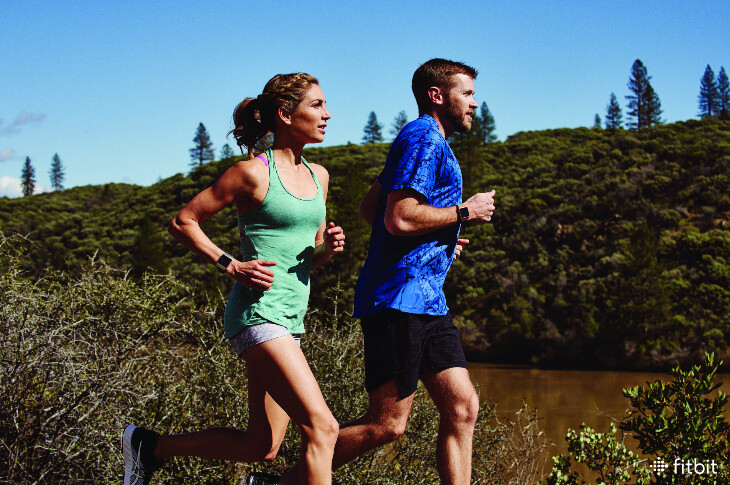
With all eyes on the U.S. when it hosts the World Athletics Championships for the first time this summer, Hall believes the U.S. could dominate at Eugene, Oregon's Hayward Field.
"USA track and field is strong against so many," said Hall. "Every event, we're in medal contention... it's a really exciting time to be a fan of the sport."
She credits her own recent run of success in part to her husband, Ryan Hall, who began coaching her after he retired from professional athletics in 2016. Whereas "tough love" has been widely embraced in athletics coaching for decades, she says his softer approach has made the difference.
Together, they hold the men's and women's American half-marathon records.
"I've had coaches in the past that were like, 'Oh, you just gave up', you know, like that kind of stuff," said Hall.
"That was really detrimental to me because it really made me believe I wasn't mentally tough. And then when you believe that about yourself, it's kind of a self-fulfilling prophecy."
Hall hopes hers can be an example in what can be achieved with a method not based in "fear," as conversation about mental health and wellbeing dominates the upper echelons of sport.
"I hope that people are seeing what creates longevity," Hall told Reuters. "That win at all costs, tough love approach, that doesn't create longevity in the sport."
The NYC Half will take place on March 20.
(02/22/2022) Views: 1,094 ⚡AMPby Amy Tennery
United Airlines NYC Half-Marathon
The United Airlines NYC Half takes runners from around the city and the globe on a 13.1-mile tour of NYC. Led by a talent-packed roster of American and international elites, runners will stop traffic in the Big Apple this March! Runners will begin their journey on Prospect Park’s Center Drive before taking the race onto Brooklyn’s streets. For the third...
more...You Know You Have to Get Comfortable With the Uncomfortable on Tough Runs—Here's How
All runners can benefit from learning these simple thought techniques.
Olympic medalist and champion marathoner Meb Keflezighi thought about dropping out of every marathon he ran—even the three he won.

So if you’ve had those thoughts, it’s certainly not just you. All runners have rough patches when pushing themselves, whether in a race, during a hard workout, or on a long run. Experts use the phrase “psychological crisis” to describe when your body’s signals dominate your attention and you think about slowing or stopping.
These moments often occur two-thirds to three-quarters of the way through a workout or race. Speaking about the Ursuline Academy runners she coaches in Dallas, elite runner Becky Wade says: “They’re deep enough into the race that they’re hurting, but not close enough to the finish line yet to get excited or start kicking. It’s easy to doubt whether they’ll be able to hang on, and they back off a bit as a protective mechanism.”
What separates Keflezighi, Wade, and other successful runners from some of us is that they know these rough patches will come, and they have mental strength techniques for dealing with them.
These techniques are quite simple. Even better, they can be learned, and then honed, so that you persevere despite the internal voice telling you to back off or drop out. Here are six elite-endorsed ways to build mental strength when the going gets tough.
1. Know Why You’re Doing This
Good goals not only guide your training. They can also fortify you during difficult stretches.
Know the purpose of a given workout or race, and how it will help you meet a personally meaningful goal, says Olympian Roisin McGettigan, a sport psychology coach who holds the Irish record in the steeplechase.
For example, “if it was a long workout, I would remind myself that this is the time to work on my strength and endurance,” McGettigan says. “If it was an early-season race, the purpose might be ‘to see where I’m at’ or ‘blow off the cobwebs.’”
These why-am-I-doing-this thoughts can occur not just when you’re acutely suffering, but also when you’re bored or apathetic. McGettigan says to remind yourself why you’re out there in those situations as well. Think of how easy running will help you recover for your next key workout, or how an hour alone on the roads provides a calming antidote to the message-a-minute pace of modern life.
If thoughts alone don’t do the job for you, McGettigan recommends using visual cues. “I often drew a smiley face or heart on my hand to remind me that I really loved what I was doing and I was saying ‘yes’ to this experience,” she says.
2. Enlist Family and Friends
Telling a few key people about your race or hard workout adds accountability. When a moment of crisis occurs, picture yourself recounting the run to them. Will you be proud to tell them how you handled the challenge?
Keflezighi was in 21st place halfway through the 2012 Olympic Marathon. Bothered by stomach and foot pain, he pondered dropping out. Then he thought about his family, who were waiting for him at the finish line. What kind of example would dropping out set for his daughters, he asked himself. He committed to finishing no matter what, and wound up crossing the line in fourth place.
You can also enlist others in practical terms. As McGettigan notes, most elite runners train with others, in part to be pulled through hard efforts when they’re struggling and might otherwise slack off. Wade tells the high schoolers she coaches to latch on to a teammate or competitor if their resolve falters during a race. Doing so can shift your attention from how much you’re hurting to the more straightforward task of maintaining contact.
3. Visualize Success
To reiterate: Successful racers know one or more psychological crises are likely to occur when they’re pushing themselves. One way they prepare for the challenge is to play the race through their head before they get to the starting line. As Wade, a 2:30 marathoner, puts it, “I envision myself in a race atmosphere, down to the course, competition, and atmosphere.”
A key benefit of doing so is that, when the urge to slow or stop strikes, you have a counter-narrative ready—that vision you implanted and watched several times of yourself rising to the challenge and continuing to run strong.
“I think having visualized the race going well in my head many times allowed me to stay engaged, because I had already told myself I was going to have a good race,” says Mark Coogan, whose long elite career was highlighted by a spot on the 1996 Olympic marathon team. “Knowing what I was going to do in the race allowed me to be more aware of how I was running physically, so I could stay loose and smooth.”
Coogan is now the coach of New Balance Boston, which includes on its roster Olympians Elle Purrier St. Pierre and Heather MacLean. He encourages his athletes to spend 10 to 15 minutes a day visualizing in the week leading up to a big race.
“I tell them to visualize seeing themselves running well,” Coogan says. “Visualize the race you want to happen.”
4. Focus on Your Body—But Not Excessively
Experts used to believe that experienced runners focus on bodily sensations (known as associating) and that less experienced runners focus on anything but their body (known as dissociating). Thanks in part to research by Noel Brick, Ph.D., a psychology professor at the University of Ulster and co-author of The Genius of Athletes, it’s now known that that old dichotomy is too simplistic.
Brick has shown that a Goldilocks-level of bodily awareness leads to lower perceived exertion. “Focusing excessively on bodily sensations, like breathing or feelings of discomfort, can be harmful to our performance,” Brick says. Focusing solely on these sensations can negatively affect performance by increasing how hard the work feels and making the run feel more unpleasant. This then leads to slowing down.
A better approach? Check in periodically, notice what your body is telling you, and then focus elsewhere. When racing a 10K, for example, Coogan would do a body check about once a mile. He’d make sure his shoulders were low and level, that his hands were cupped loosely, that he wasn’t overstriding, and so on. Now as a coach, he periodically yells “body check” to his runners to remind them to do a quick scan.
Consider running form cues when doing your own body scan, making sure you’re running relaxed but strong—after you make adjustments, take your thoughts elsewhere.
5. Chunk Your Miles
If, a few strides into a marathon you think, “Oof, 26.2 miles to go,” you likely have a long day ahead of you.
Successful runners avoid getting overwhelmed by what they’re attempting with a technique known as chunking. “I mentally break the effort down into manageable bites, and focus only on getting through the bit I’m in,” Wade says. “This often means completing a loop, making it to my water bottle, or getting through a specific stretch of road or distance.” Or, as U.S. half marathon record-holder Ryan Hall put it in his book title, run the mile you’re in.
Notice that Wade’s examples of chunking are specific tasks. Psychologists call these process goals—step-by-step actions that contribute to performing well in the short term. Focusing on process goals has two key payoffs. First, they keep you from overthinking the run’s outcome, such as what your time will be. Research has shown that thinking too much about outcome goals can induce anxiety and cause distraction.
Chunking via process goals also encourages actions that directly improve your performance. One of Coogan’s main focuses when marathoning was making sure he got his bottle every 5K, and then taking the time to drink adequately from the bottle. Doing so ensured that he stayed hydrated and fueled, and therefore didn’t falter in the final miles. Similarly, Wade’s focus on the next stretch of a road race, or her next split in a track race, leads to running that section of the race as well as possible.
Chunking is also helpful during interval workouts. Wade encourages the high schoolers she coaches to focus on just the current repeat or set, and reminds them that a recovery jog and chance to regroup is never more than a few minutes away.
6. Talk to Yourself Like You’re Your Coach
We all talk to ourselves when we run. (If you doubt that, monitor your mind on your next outing.) What matters here is the nature of that talk.
A study published in Psychophysiology found that people rated running at a given speed harder when they talked to themselves negatively compared to when their self-talk was positive. The runners also produced more cortisol, a hormone associated with emotional stress, when their self-talk was negative.
During a tough patch, Brick advises, “you might say to yourself, ‘my legs feel tired, but I can push through this.’ Research has shown that using simple statements like this can help us maintain our performance, despite how tired we feel.”
Coogan would repeat a few go-to phrases to himself, such as “you’re okay, Mark,” during races and hard workouts. And research supports Coogan’s tendency to speak to himself in the second person—using “you” rather than “I.”
In a study with cyclists, the participants did separate 10K time trials in which they used two versions of positive self-talk phrases. The phrases were identical except that in one they addressed themselves as “I,” and in the other they addressed themselves as “you.” Although the cyclists rated the time trials as feeling equally hard, when they spoke to themselves in the second person, they rode 2.2 percent faster. If that seems like an insignificant difference, consider that a 24:30 5K is 2 percent faster than a 25:00 5K. Which would you rather run?
Psychologists say this distinction works because addressing yourself as “you” provides emotional distance from the duress you’re under. In this set-up, you’re talking to yourself more like a coach would talk to you. And a good coach would never say, “you stink—drop out.” They would find a simple phrase or two that would help you weather the crisis and push through for a strong finish. With this simple switch in your thinking, you can provide that mental push for yourself.
(02/13/2022) Views: 958 ⚡AMP
by Runner’s World
Rory Linkletter breaks the Canadian half-marathon record at Houston, Linkletter ran 1:01:08 for eighth place
The Houston Half-Marathon took place Sunday morning as part of the Houston Marathon weekend, and Rory Linkletter lowered Jeff Schiebler’s 23-year-old Canadian half-marathon record of 61:28, crossing the finish line in 61:08 for eighth place. His compatriot, Ben Flanagan, was only half a minute behind him, finishing 12th in 61:38.
Going into the race, both athletes had their eyes on Schiebler’s record, which hasn’t been touched in more than two decades. Linkletter recently left the NAZ Elite track club to train with American Marathon record-holder, Ryan Hall, citing stagnation in training as his reason for making the change. His decision seems to have paid off, and he ran a huge PB Sunday morning to become the new Canadian record-holder. The 25-year-old’s previous record of 61:44 was also run on the Houston course just last year.
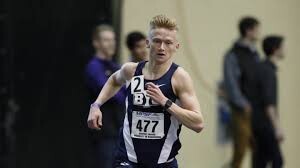
Linkletter has enjoyed plenty of success lately, and his most recent result was a second-place finish at the California International Marathon in a new personal best time of 2:12:52.
Flanagan was also on the hunt for the Canadian record this Sunday, and came agonizingly close, running just 10 seconds behind Schiebler’s time. The 27-year-old has also had a lot of success recently, winning the Canadian 10K championships in Toronto in October and taking the title in the Manchester Road Race in November. “I am looking forward to competing,” he told Canadian Running ahead of the race. “The plan is to run conservatively to tackle the Canadian record. It’s engraved in my head.”

While he didn’t achieve his goal, Flanagan ran a very strong race and we will have plenty more opportunities to watch Flanagan on the roads. He will be running a few 5,000m and 10,000m races this spring to secure a spot on Team Canada at the 2022 World Championships in Eugene, Ore., but tells us that he will be stepping up to the marathon in hopes of qualifying for the Paris 2022 Olympics.
Ethiopia’s Milkesa Tolosa won the race in 1:00:24, followed by Kenya’s John Korir in second in 1:00:27 and Wilfred Kimitei of the U.K. in third in 1:00:44.
(01/17/2022) Views: 981 ⚡AMPby Brittany Hambleton
Aramco Houston Half Marathon
The Chevron Houston Marathon offers participants a unique running experience in America's fourth largest city. The fast, flat, scenic single-loop course has been ranked as the "fastest winter marathon" and "second fastest marathon overall" by Ultimate Guide To Marathons. After 30 years of marathon-only competition, Houston added the half-marathon in 2002, with El Paso Energy as the sponsor. Today the...
more...U.S. marathon record holder Scott Fauble announced as Rory Linkletter’s new coach
It has been a busy few weeks for Canada’s Rory Linkletter, as he ran a marathon personal best at the California International Marathon (2:12:52) and left the NAZ Elite track club. Now Linkletter is joining forces with American marathon record holder Ryan Hall as his coach.
In an interview with The Lap Count, Linkletter gave some insight on what’s next for Canada’s up-and-coming marathoner.

“I have fallen in love with Flagstaff, my wife and I bought a home earlier this year, so ideally I will stay here for the remainder of my career,” says Linkletter. “As for coaching, I’ve decided to work with Ryan Hall.”
This announcement comes days after his departure from HOKA and Ben Rosario’s NAZ Elite. Linkletter is now left unsponsored but believes that Hall’s philosophy will suit his talents and career goals. “I trust that if I perform how I know I can that won’t last forever,” says Linkletter.

Hall currently coaches his wife Sara Hall, the second-fastest U.S. marathoner, clocking 2:20:32 at The Marathon Project in Chandler, Ariz. Ryan holds the fastest time ever by an American and is the only North-American man to run under 2:05 (Boston 2011). Although Ryan has retired from professional running, he remains as a coach for post-colligate athletes and marathoners in Flagstaff, Ariz.
Linkletter’s previous NAZ Elite teammate, Scott Fauble, also revealed that he will be remaining in Flagstaff. The top American at the 2019 Boston Marathon will be coached virtually by Joe Bosshard, who resides in Colorado and currently coaches Emma Coburn, Emma Bates and Cory McGee.
(12/23/2021) Views: 1,196 ⚡AMPby Marley Dickinson
Olympic Marathoner Ryan Hall Shared Things to Do the Night Before a Big Race
Ryan Hall made history as a runner, becoming the first American to break the hour barrier in the half-marathon. Since retiring from pro running in 2016, he has packed on the muscle and is now able to deadlift more than 500 pounds—while still holding onto his record as the fastest American runner of all time in the half and full marathon categories.
Hall's wife Sara, meanwhile, continues to kill it as an elite distance runner; she was the first American in over a decade to reach the podium at last year's London Marathon. Today, Sara is competing in a half-marathon race in Eugene, and in a post shared to Instagram last night, Hall broke down the seven most important things that they have both learned over the years about how to best prepare for a long-distance race.
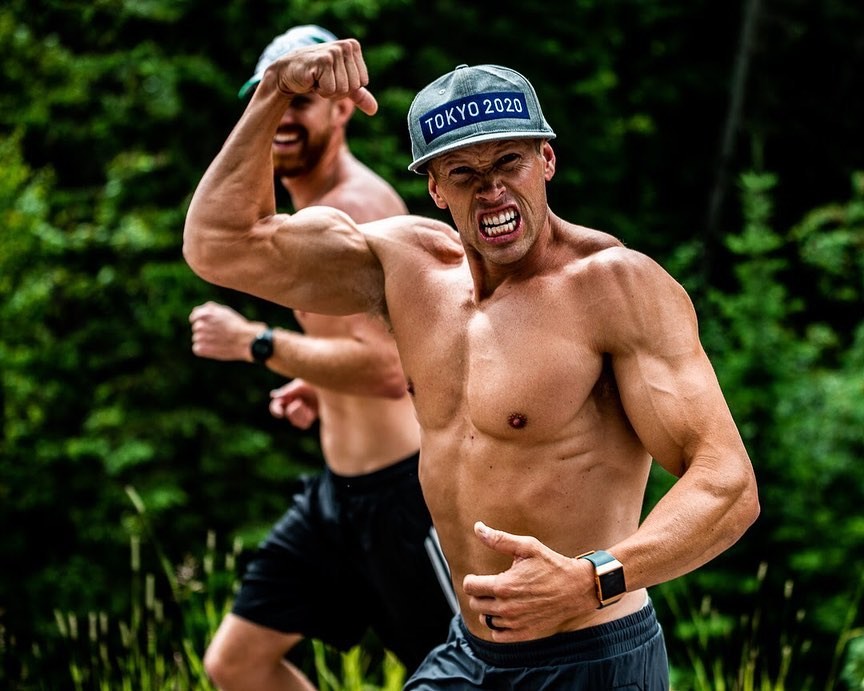
First off, Hall recommends lying down rather than sitting wherever possible. "Sitting creates all kinds of tightness and kinks that you want to avoid pre-race," he says
Secondly: eat up. A common pitfall is to not consume enough calories to keep you going when the time comes. "Don't be afraid to eat," he says. "Remember that you are fueling today for tomorrow’s race." He also advises to "keep your food simple," suggesting white meat and egg whites as good sources of protein and white rice and pasta as simple carb sources, as well as to keep your electrolytes up, "as they are needed not only for holding water/hydration but also for your muscles to neurologically fire."
Ryan Hall made history as a runner, becoming the first American to break the hour barrier in the half-marathon. Since retiring from pro running in 2016, he has packed on the muscle and is now able to deadlift more than 500 pounds—while still holding onto his record as the fastest American runner of all time in the half and full marathon categories.
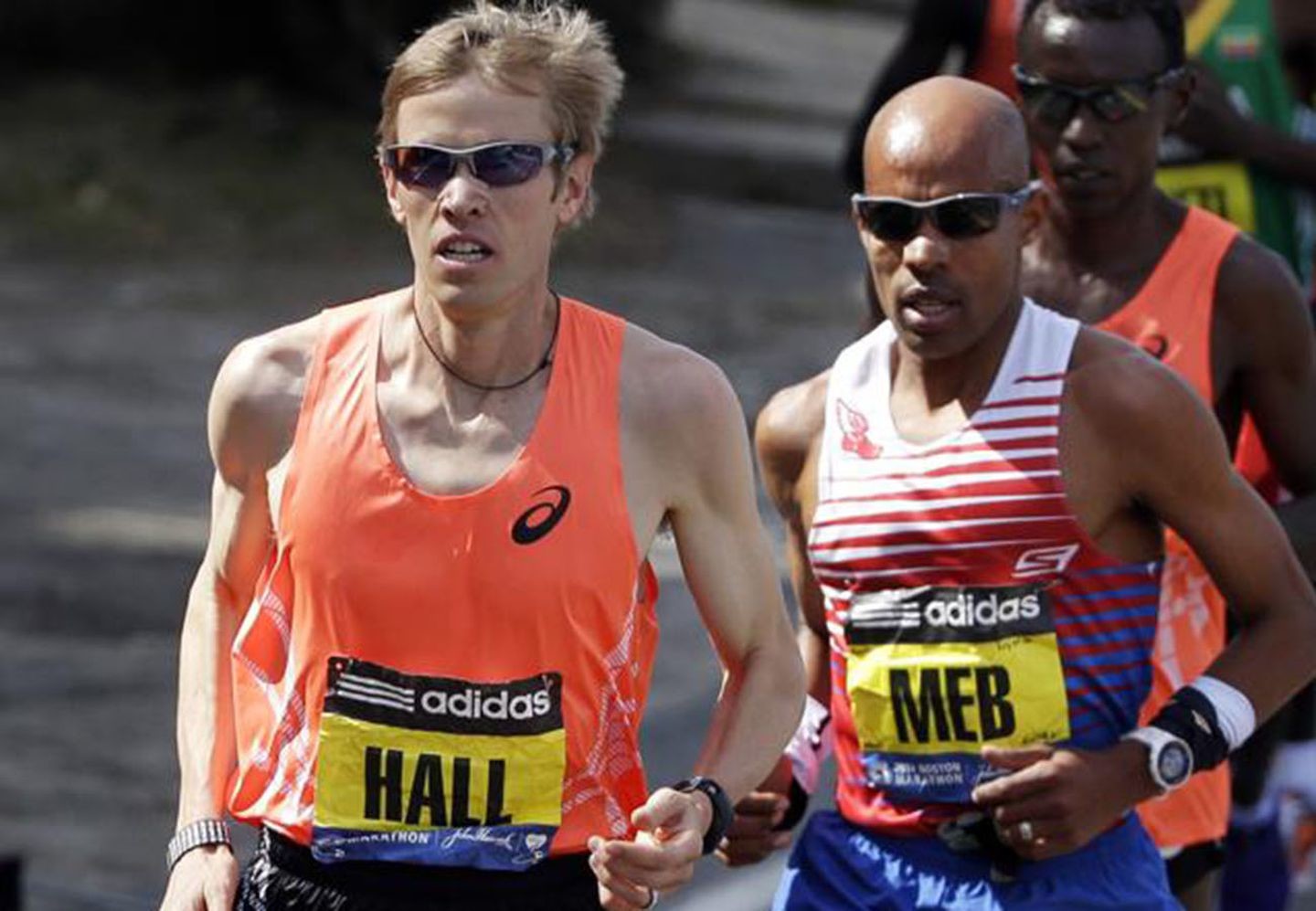
Hall's wife Sara, meanwhile, continues to kill it as an elite distance runner; she was the first American in over a decade to reach the podium at last year's London Marathon. Today, Sara is competing in a half-marathon race in Eugene, and in a post shared to Instagram last night, Hall broke down the seven most important things that they have both learned over the years about how to best prepare for a long-distance race.
First off, Hall recommends lying down rather than sitting wherever possible. "Sitting creates all kinds of tightness and kinks that you want to avoid pre-race," he says
Secondly: eat up. A common pitfall is to not consume enough calories to keep you going when the time comes. "Don't be afraid to eat," he says. "Remember that you are fueling today for tomorrow’s race." He also advises to "keep your food simple," suggesting white meat and egg whites as good sources of protein and white rice and pasta as simple carb sources, as well as to keep your electrolytes up, "as they are needed not only for holding water/hydration but also for your muscles to neurologically fire."
He also urges you to stay away from hot tubs as they can "leave legs feeling jello-y", and says it's perfectly normal to not sleep very well the night before a big race.
Finally, he says, be sure to enjoy yourself. "Reminding myself of this reality takes the pressure off and reminds me to soak it all in and enjoy every part of the experience," he says. "I’ve found, when I am having the most fun is when I’m usually performing the best."
(08/23/2021) Views: 1,023 ⚡AMPby Philip Ellis
Sarah Hall ran the second fastest time for the marathon at the Marathon Project
Sara Hall won The Marathon Project in Chandler, Arizona, on Sunday, December 20, running 2:20:32—making her the second-fastest American marathoner of all time. She took almost 90 seconds off her previous PR of 2:22:01, which she ran only 11 weeks ago at the London Marathon.
For about the first 18 miles of the race Hall, 37, flirted with the pace of Deena Kastor’s American record— 2:19:36—which has stood since 2006. But Hall, who ran behind two male pacesetters, couldn’t quite maintain the pace through the later miles.

Keira D’Amato, the Virginia realtor who earlier this year ran an American record for the women’s-only 10 mile, finished second in 2:22:56, taking nearly 12 minutes off her previous marathon best.
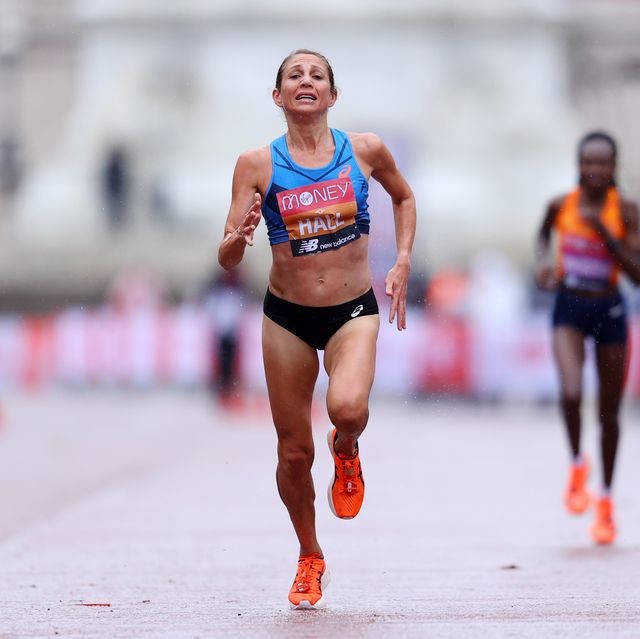
Kellyn Taylor, 34, who went with Hall for the first half of the race, fell back in the second half and finished in 2:25:22.
The 37-year-old Hall ran a personal best 2:22.01 at London on Oct. 4 and was hoping on a short turnaround to better Deena Kastor's 14-year American record of 2:19.36, set at London in 2006. She came close with another significant PR drop, improving from sixth best in U.S. history to second ahead of Jordan Hasay's 2:20.57 at Chicago in 2017.
"London was so wonderful getting to place as high as I possibly could have," Hall said. "This was more of a time trial, and that's kind of tough when it feels like training sometimes. I really look forward to when we can get back to normal races with crowds, but I feel so grateful for the guys I was able to run with. They kept me honest in the second half when I was really struggling."
She said being No. 2 on the American marathon list is "kind of surreal. I've had so much disappointment in my career (including not finishing at the U.S. Olympic Trials in February) and I would have walked from this sport 10 years ago. But my husband just relentlessly believed in me and God encouraged me there was more there. I kind of (rediscovered) my love for it. Getting rid of the fear of failure really helped me enjoy it a lot more."
Two-time Olympian Ryan Hall, third fastest all-time among American men's marathoners, now coaches his wife, whose next goal is to make the U.S. Olympic track team for Tokyo in the 10,000-meter.
Sara Hall 2:20:32
Keira D'Amato 2:22:56
Kellyn Taylor 2:25:22
Emma Bates 2:25:40
Natasha Wodak 2:26:19
(12/20/2020) Views: 1,074 ⚡AMPGalen Rupp breezes to victory in a popup half marathon in Lane County
Galen Rupp Runs 60:22, Suguru Osako Runs 61:15 In Half Marathon
Galen Rupp cruised to victory in a special half marathon Friday near Row River in Lane County.

The former University of Oregon star and two-time Olympic medalist finished in 1 hour, 22 seconds, well in front of Japanese Olympian Suguru Osako, who crossed in 1:01:15.
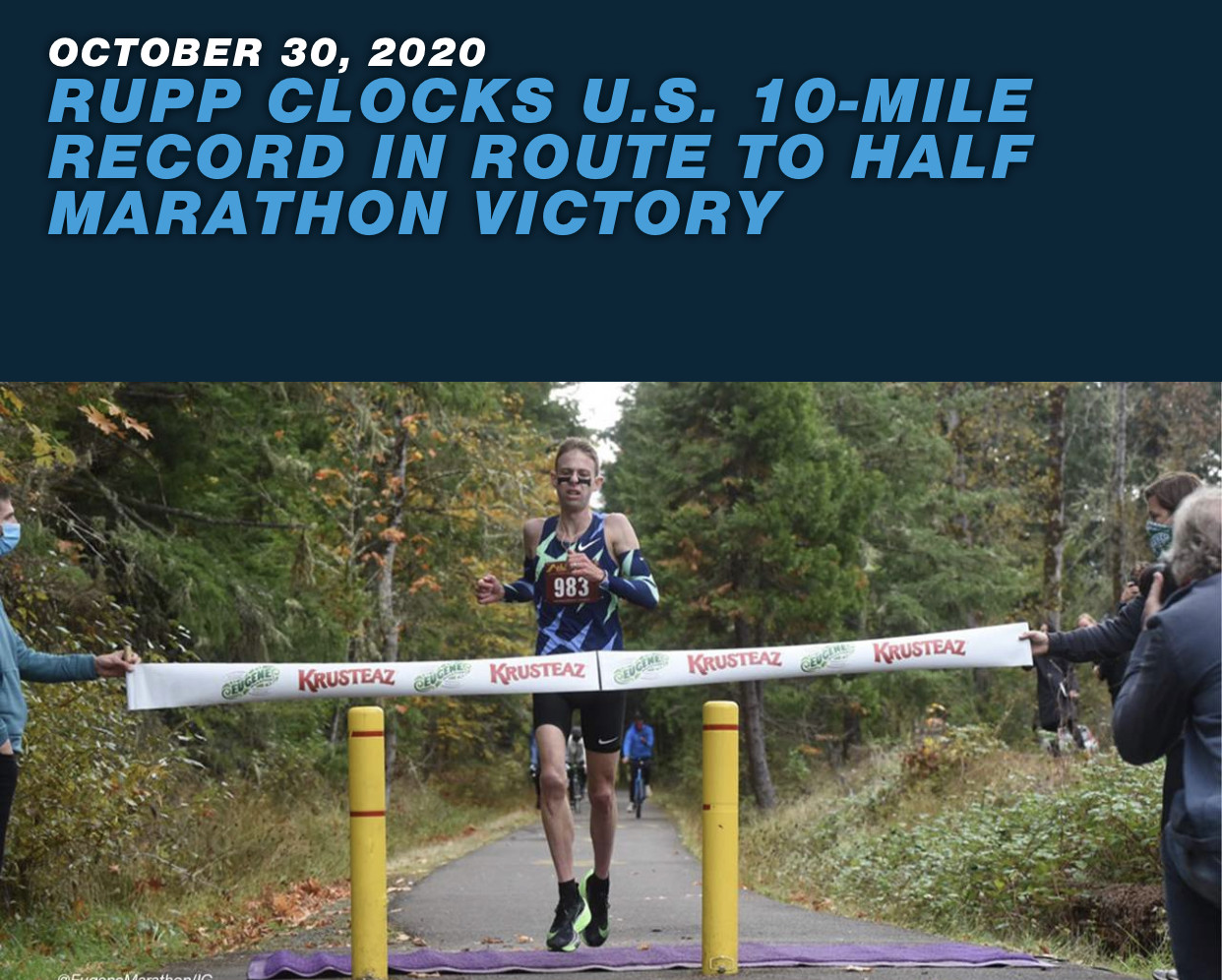
This was Rupp’s first competition since he won the U.S. Olympic Marathon Trials in Atlanta last February.
“It’s been a challenging year for everybody because of COVID,” Rupp said. “I’m so thankful and grateful to have this opportunity just to race. That was my whole mentality coming in here -- get a race in. If it happened that I ran really fast, great.”
The race was set up by the Eugene Marathon. The precise location and start time were kept secret to discourage spectators and stay within Oregon’s coronavirus protocols.
The lack of reliable internet service at the scene prevented the race from being live-streamed. Few details of the action were available while the runners were in the course.
Rupp’s winning time was well short of the U.S. record of 59:43, held by Ryan Hall since 2007. But Rupp’s 10-mile spit of 45:53 betters the U.S. 10-mile record of 46:13 held by Greg Meyer since 1983.
Ian Dobson of the Eugene Marathon said Rupp’s 10-mile time met all record criteria.
“Any time you set a record, it’s a great day,” Rupp said. "I think this technically is my PR (personal record) for a half marathon too. I ran a little quicker in Rome a few years ago, but that wasn’t a record-eligible course.
“Technically I came out with a PR. So, it was a great day. Any time you can do that, you can’t leave disappointed. I would have loved to go faster. It just wasn’t in the cards today.”
(10/31/2020) Views: 1,117 ⚡AMPGalen Rupp and Suguru Osako are aiming for a fast half marathon on Friday near Eugene
Olympians Galen Rupp and Suguru Osako have signed on for what is expected to be a blazingly fast half marathon Friday at an undisclosed location in Lane County.
Eugene Marathon has set up the course and ensured it is certified. Organizers are declining to reveal the course’s location or time in deference to the coronavirus pandemic. All participants have been tested for the virus.
Rupp won the men’s race at 2020 U.S. Olympic Marathon Trials last February in Atlanta. The former University of Oregon star is the 2012 Olympic silver medalist in the 10,000 meters and the 2016 Olympic bronze medalist in the marathon. He holds the U.S. record for the 10,000.
Osako is the Japanese record-holder in the marathon, as well as the 3,000 and 5,000 meters.
The two runners are former teammates with the now defunct Nike Oregon Project. Both are based in Portland, although Osako has been training in Flagstaff, Arizona.
“Galen called me maybe a month ago,” said Pete Julian, Osako’s coach. "He asked if Suguru would be interested in throwing down somewhere in Oregon in this time frame.
“I was like, ‘Galen, you called at the perfect time. That’s exactly what we want to do.'”
Rupp has not raced since winning in Atlanta. Osako was active with Julian’s group in track races over the summer. He had begun training for December’s Honolulu Marathon before that was canceled because of the coronavirus pandemic.
“I think they’re pretty lined up,” Julian said of the two runners. “Galen hasn’t raced in a long time. But he is old enough and wise enough now that if he says wants to run a good, hard, fast half marathon, you have to believe he is ready to go. I know Suguru is ready to go. It will be cool.”
The course is said to be flat. And if the race is fast, well, the U.S. record for a half marathon of 59 minutes, 43 seconds has been held by Ryan Hall since 2007. The Japanese half-marathon record is of 1:00.00 was set earlier this year by Yusuke Ogura.
Julian wouldn’t call Friday’s race a record attempt.
“Hey, man, 13.1 miles is a long way to go,” Julian said. “It’s almost foolish to say we’re targeting something because I know nothing about the course. My assumption is if the weather is nice, it’s warm enough and it’s not windy, and you have two guys like that, running around an hour for a half marathon is certainly within their capabilities.”
Eugene Marathon will be posting more details on its Twitter and Instagram accounts as the race nears. On Friday, organizers will use those platforms to provide updates on the progress of the competition.
(10/28/2020) Views: 1,314 ⚡AMPby Ken Goe
SARA HALL REFLECTS ON HARD WORK AND MOTHERHOOD IN BUILD UP TO LONDON MARATHON
Running At Peak Form Into Her Late 30s, Hall Continues Lifelong Pattern Of Putting In The Effort
When the future of racing in 2020 looked bleak as the COVID-19 crisis swept the world last spring, Sara Hall didn’t lose hope.

“I started training for a marathon in faith, before I knew there would be any real competitions,” said Hall, who has been eager to finally move past her heartbreaking performance from February at the U.S. Olympic Marathon Trials, where she dropped out at mile 22.
“It would have been easier just to hit the couch, but I set my mind on running a marathon, some way some how.”
Even if it meant racing 26.2 miles by herself, she said.
Ryan Hall, a two-time U.S. Olympic marathoner who retired in 2016, said his wife’s relentless competitive drive is one of his biggest challenges as her coach.
“She loves to train hard, but has a hard time taking extended breaks,” he said. “She is always ‘chomping at the bit’ to get back out there.”
When Hall heard that the London Marathon would host a highly secure, elite-only race amid the pandemic, she jumped at the precious opportunity.
On Oct. 4, she will face some of the world’s best marathoners, including defending London champion and world record holder Brigid Kosgei of Kenya and U.S. Olympic Marathon Trials champion Molly Seidel.

“Getting into the London Marathon felt like such a reward for a lot of perseverance this year — being willing to put in the work on faith alone,” said Hall, 37. “It felt against all odds to get to toe the line in a world marathon major.”
‘Against all odds’ is a familiar theme for Hall, a mother of four who has posted the fastest times of her career well into her 30s, including a 2:22 marathon last year in Berlin, where she finished fifth. Last month, with two male pacers, she ran a personal best of 1:08:18 in a half marathon along the Row River Trail in south of Eugene, Oregon, making her the sixth-fastest American woman ever in that distance.
A former Foot Locker Cross Country National Champion in high school and distance standout at Stanford University, Hall has competed at the highest levels of distance running for two decades — a great accomplishment in itself.
“It’s definitely surprised me,” she said of her longevity in the sport. “I think it’s a lot of factors, but I think the biggest are being naturally durable and learning to be really mentally-emotionally resilient.”
Ten years ago, after disappointing results as a 1,500-meter and 5,000-meter runner on the track, Hall thought her elite running career was over. She credits her Christian faith and Ryan with convincing her she had more to achieve.
Since then, she’s not only moved up to and mastered the marathon distance, she’s done it while becoming a mother to four adopted sisters from Ethiopia.
“When we adopted them, I didn’t think I’d be able to keep competing, but instead I’ve improved every year since they’ve been here,” said Hall, who is using her race in London to raise money for homeless children in Ethiopia, where she and Ryan have spent a lot of time working on various causes.
“I get to model to (my daughters) so many character aspects I want to instill in them: picking yourself up after defeat, taking risks, hard work, commitment,” she said. “Running is the greatest teacher.”
Inspired by their parents, three of the Halls' daughters have become runners. The oldest, Hana, currently a freshman runner at Grand Canyon University, won the Division 2 Arizona Cross Country Championships last fall. Hana and Mia, 16, both ran with their mom at the half marathon in Oregon.
In addition managing her kids’ remote learning and getting in her workouts, Hall has made time to discuss the racial justice movements happening across the United States.
“I’ve told my daughters about George Floyd, Ahmaud Arbery and Breonna Taylor,” she said. “We’ve discussed the movement in the U.S. and the systemic racism over the last 400 years that is the backstory to these recent events. I personally have been learning a lot.”
Despite the world’s turmoil in recent months, Hall has maintained extraordinary focus on the road ahead.
In the London Marathon, which will be held on a closed-loop course around St. James Park, she hopes to snag a new personal best and would love to finally land on the podium, after finishing fifth at the Frankfurt and Berlin Marathons.
“I’m focused on having my best marathon yet,” she said.
(09/26/2020) Views: 1,275 ⚡AMPTCS London Marathon
The London Marathon was first run on March 29, 1981 and has been held in the spring of every year since 2010. It is sponsored by Virgin Money and was founded by the former Olympic champion and journalist Chris Brasher and Welsh athlete John Disley. It is organized by Hugh Brasher (son of Chris) as Race Director and Nick Bitel...
more...Ryan Hall completes 69K ultramarathon, calls it ‘the hardest thing I’ve ever done’
Despite running just five times in 2020, the former U.S. Olympian made it through his first ultramarathon
Since retiring from professional running in 2016, American half-marathon record-holder Ryan Hall has not raced too much, and in 2020, he has only gone for a total of five training runs.


Despite this extremely low mileage for the year, he ran his first ultramarathon, completing the 69K Grand Traverse Mountain Run in Crested Butte, Colo., in 12:47:46.
In an interview after the race, Hall told the Grand Traverse team that he had hoped for “an epic adventure” that was “super hard,” and he said the event “exceeded super hard — it was super, super, super hard.”
The Grand Traverse
Local athlete Cam Smith of Crested Butte won the 69K race in an extremely tight finish, crossing the line just two seconds faster than second-place finisher Nick Coury. Smith won the race in 7:03:04. Hall was almost six hours back of the top finishers, but as he said before the race, he wasn’t running to compete for the win, he was just looking to finish.
“It was not pretty, it was not fast, but I got to the finish line,” he said in an Instagram video after the race. “I got the job done.” In his post-race interview, he said he has “never been more excited to reach a finish line.”
While he of course knew it would be a tough race, especially with no training, he said he still underestimated the challenge.
“It’s a really unique kind of pain,” he said, adding later on in his own video that the race was the hardest thing he has ever done.
No training
Hall works out a lot (he has been heavily invested in powerlifting since retiring from running), but deadlifts and benchpress reps won’t prepare you for any running race, let alone an ultramarathon. This isn’t his first time taking on a running challenge with little training under his belt.
In 2017, he ran the World Marathon Challenge (WMC) — an event in which he ran seven marathons in seven days on all seven continents — on next to no training. He finished in fifth place at that race, but he had no illusions that he could register a top result in Colorado over the weekend. He noted that the no-training approach likely isn’t a good idea for ultramarathons, saying, “I usually don’t recommend these kinds of races off five days of training a year.
Do as I say, not as I do.”
(09/13/2020) Views: 1,146 ⚡AMPby Running Magazine
Ryan Hall plans to run his first ultramarathon in Colorado
Ryan Hall retired from professional running in 2016, and since then, even though he has participated in a few races, his focus has been on powerlifting. On Saturday, Hall, the U.S. half-marathon record-holder, announced that he is getting back into racing, but instead of his once-preferred distances of 21K or 42K, he will be running a 69K race — his first crack at an ultramarathon.
To add to this already-daunting challenge, he will be racing after running just five times in 2020. The event, the Grand Traverse Mountain Run, is set to be held on September 5 in Crested Butte, Colo.

In an Instagram video announcing his race plans, Hall said the Grand Traverse will be an “epic challenge,” adding that he likes to “make it even more epic by not training.” He cited his running of the World Marathon Challenge (WMC) in 2017, an event for which he apparently trained very little. The WMC is a week-long event that sees participants run seven marathons in seven days on all seven continents. Despite his minimal training for that challenge, Hall finished in fifth place.
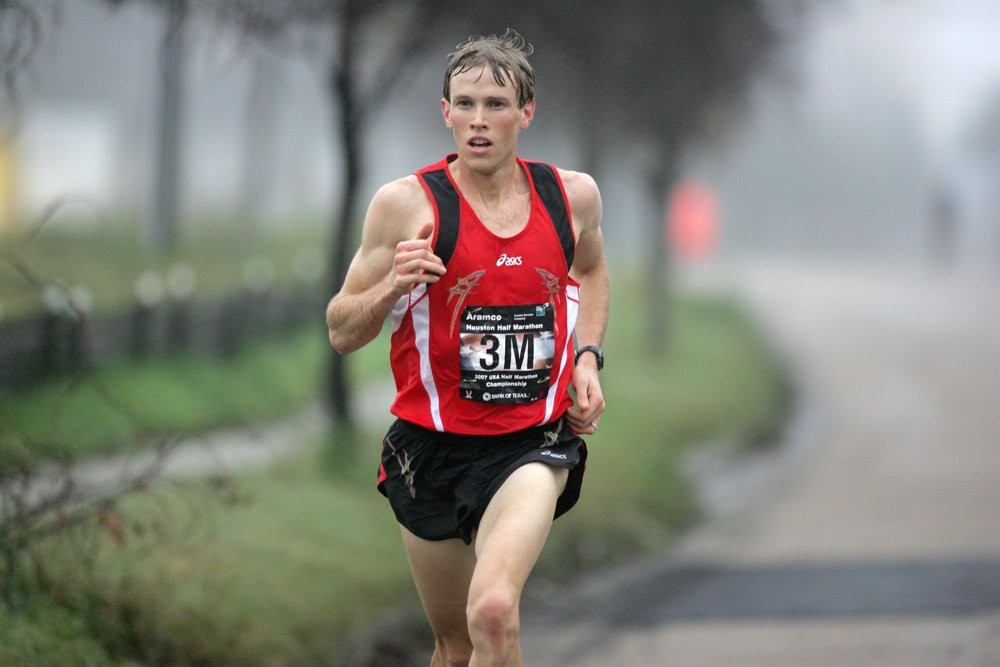
Although he was already heavily invested in weightlifting in 2017, Hall had only been retired from professional running for a year. Now more than four years removed from the lifestyle of an elite runner, Hall may have a tougher time getting through such an arduous challenge.
He noted that he has incorporated other cardio exercises into his training, like boxing, but after averaging less than one run per month all year, he acknowledged that this won’t be an easy undertaking. “I’m going to be in way over my head on this one,” he said, “but that’s where I like to be as an athlete.”
Hall said he is “so stoked for this challenge,” which features more than 2,700m of elevation gain, and he asked any of his ultrarunner followers to leave him tips for the race.
(08/31/2020) Views: 1,179 ⚡AMPby Ben Snider-McGrath
Sara Hall Runs Impressive Half Marathon PR—Without the Hoopla
Her 1:08:18 puts her sixth on the list of U.S. performers.
In the Oregon woods, on a bike trail along the shore of Dorena Lake, 30 miles south of Eugene, elite athlete Sara Hall ran her first race in more than five months on the roads—just her, two male pacers, and two of her four daughters, Hana and Mia, following at a distance.


Hall, 37, finished the half marathon in 1:08:18, a personal record by 40 seconds and good for sixth-fastest American of all time. She averaged 5:12 pace.
It felt like a mirage. The race, called the Row River Half Marathon and staged by the organizers of the Eugene Marathon, began at 5:52 a.m., just as the sun was beginning to rise over the hills and the overnight fog was disappearing. The small pack of runners disappeared east along the bike path to a turnaround point, came back a little more than an hour later, and quickly left the area—an effort to avoid the heat of the day and to discourage any spectators in the COVID era.
It was a far cry from Hall’s last race, the Olympic Marathon Trials on February 29 in Atlanta, where close to 700 men and women started the event and 200,000 screaming fans crammed the streets with signs and cowbells. Hall, a 2:22 marathoner who thought she was in the best shape of her life and in a good position to make her first Olympic team, dropped out after the 22-mile mark.
Typically a frequent racer, Hall has had to live with the disappointment from the Trials for five months, with no opportunities to redeem herself after the pandemic shut down all races of note. Pro runners like her have been scrambling to find opportunities to test their fitness outside of their own training while keeping within guidelines for safe events during the pandemic.
“It felt surprisingly really good, yeah,” Hall said immediately after finishing. “I wasn’t sure how I’d feel out here. I’ve been pretty buried in training because there’s no races to freshen up for. So I just am, like, grinding for forever. And I was like hopefully my legs come around. To run a big PR like that without really a race atmosphere is really encouraging.”
Hall, who lives and trains at altitude in Flagstaff, Arizona, says she’s more of a competitor than a time trialer. Without the adrenaline of a pack, she wasn’t sure if she’s be able to access all her energy. But she was.
“I tried to just keep telling myself the mantras that keep me going in training,” she said. “But it’s a little harder. When I ran my last half, it was in Houston in a pack of African runners, and I was just getting gritty and mixing it up with them. It’s definitely a different mode out here. But I’m super thankful to the guys that were helping me out through the race. That helped a lot.”
Hall was paced by Eric Finan of Eugene and Jared Carson of Portland, both of whom were also entered into the Trials.
Race director Ian Dobson, a U.S. Olympian in 2008 and friend of Ryan Hall and Sara Hall since their days at Stanford University, floated the idea of putting on a socially distant race to them a couple of months ago. All participants and staff had current negative COVID tests and provided information for contact tracing, should it be necessary. Everyone but the runners wore masks.
It was an opportunity for Hall to get a tuneup race in—she has a marathon coming up in the fall—and a chance for the events team of the Eugene Marathon to host a race, after their flagship event was canceled in April.
“We wanted to take this unique opportunity to have someone like Sara be part of the event,” Dobson said. “And we want to be part of the storytelling—what does success for the running community look like during the Coranvirus?”
He said he hopes that big races make a speedy return instead of morphing into one-off boutique events with five or fewer participants. “The mass participation road race is such a cool thing,” he said. “That’s the business we’re in; it’s what we want to do. That said, given the current reality, this is what we can do.”
The Row River course was USATF-certified and the race is in the process of being sanctioned by USATF, which would make Hall’s time eligible to appear on record lists. She and her family are staying in Eugene for another week or so for more sea level training, as she prepares for the next marathon.
“I feel over-the-moon excited,” she said of the upcoming race. “I think I’m going to be the happiest person on that starting line. I’ve put in so much training just on faith that there would be opportunities. And even though everything was just canceled canceled canceled, to be able to have an actual race—I just wanted to cry when I got in. The trials was a massive disappointment, and I really want to be able to turn the page on that and continue to build and improve.”
Although Hall can’t yet say what race that is, observers believe it is the London Marathon, which yesterday announced it will host an elite-only version of its race around a loop in St. James Park.
Hall’s daughter Hana, 20, finished the Row River Half in 1:20:03. Her daughter Mia, 16, who has only been running for a year, finished in 1:23:18.
(08/08/2020) Views: 1,224 ⚡AMPby Runner’s World
Dathan Ritzenhein Retires at Age 37
Dathan Ritzenhein, a high school prodigy who went on to become a two-time global medalist, three-time Olympian, five-time national champion and a 2:07 marathoner, has decided to retire after 16 years of professional running.
The 37 year-old, who grew up in Rockford, Mich., and competed for the University of Colorado during his collegiate career, decided that he had accomplished all of his main goals and the time was right to shift his focus away from competitive running.
“I guess I’m not necessarily 25 and retiring in my prime,” Ritzenhein told Race Results Weekly by telephone from his Michigan home yesterday just after finishing a hard 10-mile run. He continued: “I have things that I wish that I have done in my career, but I’m also very satisfied, too. I think right now it’s something that I thought a lot about the last year.

I’ve had a lot of nostalgic moments, looking back a lot more than looking forward. So, I don’t know that I had a lot more goals that I was looking to accomplish.”
While still competing for Colorado, Ritzenhein made his first of three Olympic teams in 2004, despite finishing only 22nd at the USA Olympic Trials in the 10,000m. Ritzenhein made the team because he was one of only five athletes entered who had the Olympic “A” standard of 27:49.00 (he had run 27:38.50 in his debut at the distance in April, then a U.S. collegiate record). Trials winner Meb Keflezighi opted for the marathon (where he would win the silver medal) and Bob Kennedy dropped out. That left Abdi Abdirahman, Dan Browne (who would also compete in the Marathon) and Ritzenhein to run the 10,000m in Athens, the three remaining finishers who had the standard. Running on a badly injured foot in Athens, Ritzenhein failed to finish.

“My first one was a miserable experience where I hobbled my way on,” Ritzenhein said of making his first Olympic team. He continued: “I made the standard, and just not many people had it. Bob Kennedy had it and Meb, and Dan Browne and Abdi. Meb ended up running the marathon and Bob Kennedy dropped out of the 10-K, and I knew I just had to finish the race.”
Ritzenhein made his professional racing debut at the Boclassic 10-K in Bolzano, Italy, on December 31, 2004, the day after his 22nd birthday. He pushed the pace with two laps to go in the 8-lap race and finished third behind Sergey Lebed of Ukraine and Stefano Baldini of Italy (Baldini was the reigning Olympic Marathon champion). Ritzenhein had signed with Nike just prior to the Athens Olympics, and Brad Hudson became his coach. He won both the USATF cross country and 10-K road running titles in 2005, and under Hudson’s coaching jumped right to the marathon in 2006, making his debut at the New York City Marathon. It was a controversial decision, and after a 1:05:35 first half he finished 11th in 2:14:01, calling the discomfort he endured in the last four miles “undescribable.”
Almost exactly a year later, Ritzenhein returned to New York for the 2008 USA Olympic Trials Marathon (which were held in November, 2007), and he finished second to Ryan Hall in 2:11:07, a personal best. He would go on to finish ninth in the Olympic Marathon the following year in Beijing, and it looked like Ritzenhein was going to focus mainly on the marathon.
But unlike other track runners who moved up, Ritzenhein wasn’t so quick to abandon the track, cross country or road races below the marathon distance. He used his marathon strength to great effect in training, and his track running was never better. In one of his best years, 2009, he set the American record for 5000m of 12:56.27 (since broken), ran a 10,000m personal best of 27:22.28 when he finished sixth at the IAAF World Championships 10,000m, and won a bronze medal at the IAAF World Half-Marathon Championships, running 1:00:00. He was also the runner-up at the USATF championships for both the 10,000m and half-marathon, and finished 10th at the London Marathon.
“That’s what always drove me,” said Ritzenhein. “I would always have these goals and you’d have these valleys between them. Really high moments, like the American record, bronze medal at the world junior championships (in cross country), or the world half-marathon championships. Those are the races where you just feel invincible.”
But he was not invincible. Ritzenhein suffered numerous injuries throughout his career (he recalled having over 40 MRI’s), and had to have surgeries three times. He missed most of 2011 due to a surgery to his right Achilles tendon, but his long recovery (made even longer by a lingering infection) set him up for his most dramatic year, 2012.
“After three years away from the track I had doubts,” Ritzenhein said. “I poured it all out there. At the Olympic Trials it was an epic day. I didn’t have the standard and quite a few people in the race did.” He added: “It seemed like an impossible task.”
Ritzenhein said that he will always be a runner, and that he’ll still run hard sometimes (he averaged a six-minute pace on yesterday’s 10-miler, he said). He already coaches a few athletes, including marathoner Parker Stinson.
“This isn’t the end for sure,” he said. “This is all I know. The sport of running is my passion and my love.” He added: “I’m looking forward to continuing to give back to the sport; coaching is a passion of mine. I love writing, to talk to people, and give people advice. It’s in my DNA. I’ll always run. It’s just something I can’t go without.”
(05/07/2020) Views: 1,310 ⚡AMPby David Monti
Remembering Boston 2014, when Meb Keflezighi ran all the way to one of the defining victories in the race’s 123-year history, becoming the first U.S. male runner to win in 31 years
Before starting the 2014 Boston Marathon, Meb Keflezighi had four names scribbled in marker on his race bib corners: Martin, Krystle, Lingzi and Sean.
Martin Richard, Krystle Campbell and Lingzi Lu died as a result of the twin bombings near the Boylston Street finish line during the 2013 Boston Marathon. Three days later, Sean Collier, a policeman, was shot and killed in a confrontation with the attackers.
Keflezighi ran in 2014 in their memory and with his own remembrance. All the way to one of the defining victories in the race’s 123-year history, becoming the first U.S. male runner to win in 31 years.

A year earlier, Keflezighi left an observer grandstand near the finish line of the Boston Marathon about five minutes before the bombs went off.
“The four victims that died in the explosion were spectators just like me,” he said.

It marked a career turnaround at age 38 for Keflezighi, who had been dropped by Nike three years earlier. He considered retirement. The 2004 Olympic silver medalist and 2009 New York City Marathon champion had placed 23rd at his previous marathon and withdrew before the 2013 Boston race with a calf injury.
Keflezighi went out hard from the start, keen on meeting his minimum pre-race goal: to set a personal best. At the halfway point, he and little-known American Josphat Boit led the field by 30 seconds.
In the chase pack, other Americans conversed and strategized not to push the pace in pursuit.
“We needed to give Meb as much space as possible,” Ryan Hall, the fastest American marathoner in history, texted Tim Layden, then of Sports Illustrated and now of NBC Sports. “If the African guys were going to try to catch him, we weren’t going to do the work to help them. It wasn’t my day to win, as much as I wanted to. Meb winning was the next best thing and what the US needed.”
Keflezighi pulled away from Boit between the 15th and 19th miles, opening a one-minute lead. The margin dropped to about eight seconds at the 25-mile mark, but Keflezighi held off Kenyan Wilson Chebet by 11 seconds on Boylston.
“This is beyond running,” Keflezighi, whose full first name, Mebrahtom, means “let there be light” in the Eritrean language, said in a finish-area TV interview. “This is for the people, for the Boston Strong. We’re resilient as runners.”
Keflezighi, born in Eritrea, moved to the U.S. at age 12. His first time running seriously was in San Diego in junior high school, when PE students were given a grade for how much effort they put into a mile. He eventually earned a scholarship to UCLA and made his first Olympic team at age 25 in 2000.
Keflezighi retired from elite running in 2017 after 26 marathons, but he felt complete after Boston in 2014.
“99.9 of my career was fulfilled,” Keflezighi said after winning Boston. “Today, 110 percent.”
(04/20/2020) Views: 1,397 ⚡AMPby Meb Keflezighi
Boston Marathon
Among the nation’s oldest athletic clubs, the B.A.A. was established in 1887, and, in 1896, more than half of the U.S. Olympic Team at the first modern games was composed of B.A.A. club members. The Olympic Games provided the inspiration for the first Boston Marathon, which culminated the B.A.A. Games on April 19, 1897. John J. McDermott emerged from a...
more...Jemal Yimer, Jared Ward, Sara Hall, Molly huddle and more on Tap at 2020 Houston Half Marathon
Year-in, year-out, no American half marathon assembles better fields than Houston. In addition to being the site of both the men’s (Ryan Hall, 2007) and women’s (Molly Huddle, 2018) American records, there is always a deep list of sub-60:00 men and sub-67:00 women on the start line. Last year, Brigid Kosgei kicked off one of the greatest years in the history of distance running with a win in Houston.
The international fields in Houston, which takes place on Sunday, are strong once again. But from an American perspective, the more intriguing storyline is the impending US Olympic Marathon Trials, to be held in six weeks’ time in Atlanta. Several top Trials contenders — Molly Huddle and Sara Hall on the women’s side, Jared Ward and Shadrack Biwott on the men’s — will be racing on Sunday, and while no result will make or break their Trials hopes, it does give us one last piece of evidence to go on.
When Huddle debuted in the marathon, placing third in New York in 2016, it looked to be the first step in a journey that would culminate at the 2020 Olympic marathon. Among Americans, Huddle was the queen of all distances between 5k and the half marathon and her grind-it-out style seemed well-suited to marathon success.

Tuliamuk, the 2018 US half marathon champ, is an option, though she’s got progressively slower in Houston the last three years, from 69:58 in 2017 to 71:41 in 2018 to 72:03 last year. She’ll need to get back to her 2017 form to crack the top two Americans on Sunday.
Katy Jermann (née Moen) and Molly Seidel both ran 70:27 last year, tied for third-fastest in the US. Of the two, Seidel, who in 2015 broke the “Foot Locker curse” to win the the 2015 NCAA XC title, is the more intriguing prospect. Seidel had never run a half before October 2019, but Houston will be her third in three months, and she plans to make her marathon debut at the Trials.
With a 2:09 in Boston and two sixth-place finishes in New York, Jared Ward has been the most consistent American marathoner over the last 18 months. Beating him on Sunday doesn’t guarantee a repeat result next month in Atlanta, but it would be a positive sign for the other Olympic hopefuls in this field.
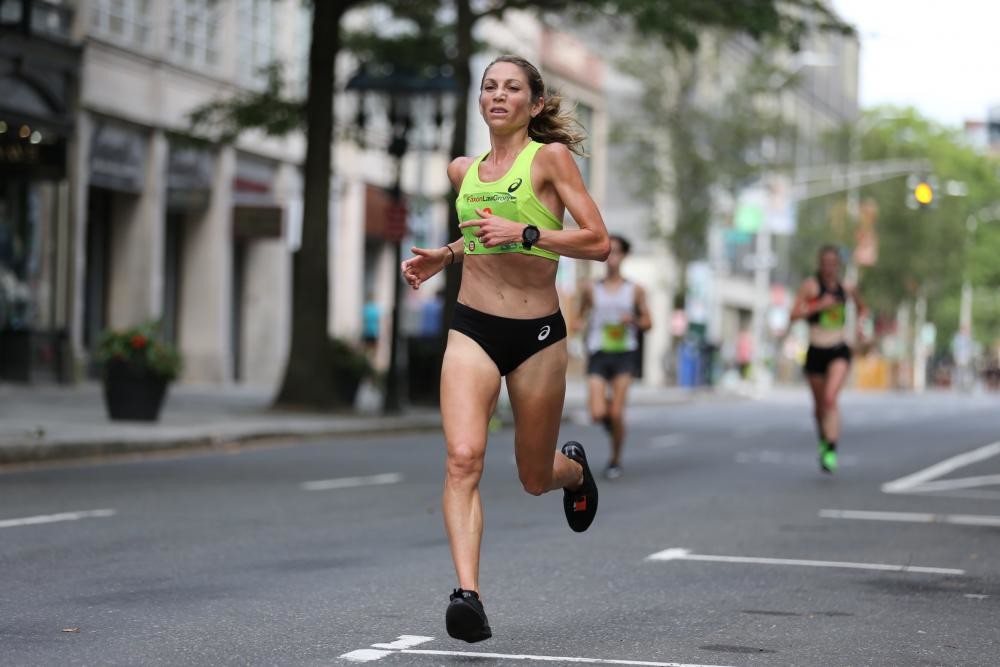
With a high of 59, the temperature looks great for running on Sunday, though 13 mph winds mean the conditions won’t be perfect. Still, with the talent on hand in Houston, there should be competitive races up front. In the men’s race, there’s no clear favorite.
Ethiopia’s Jemal Yimer (58:33), the fourth-fastest man ever, was a close second last year after taking a wrong turn late in the race. He went on to run 59:09 in Valencia in October, where he finished two seconds behind Kenya’s Bernard Ngeno, also entered in Houston. Andamlak Belihu had a terrific 2019 (26:53/59:10, 5th at Worlds in 10k), while the last two Houston champs, Shura Kitata of Ethiopia and Jake Robertson of New Zealand, return as well.
(01/17/2020) Views: 1,648 ⚡AMPAramco Houston Half Marathon
The Chevron Houston Marathon offers participants a unique running experience in America's fourth largest city. The fast, flat, scenic single-loop course has been ranked as the "fastest winter marathon" and "second fastest marathon overall" by Ultimate Guide To Marathons. After 30 years of marathon-only competition, Houston added the half-marathon in 2002, with El Paso Energy as the sponsor. Today the...
more...Sara Hall of Flagstaff finished fifth Sunday at the Berlin Marathon, first among American women
Sara Hall, 36, ran a personal best 2 hours, 22 minutes, 16 seconds, sixth fastest in U.S. marathon history. Her previous PR was 2:26.20 at the 2018 Ottawa Marathon.
The women’s race was won by Ashete Bekere in 2:20:14, pulling away at the end from fellow-Ethiopian Mare Dibaba, 2:20:21, with Kenya’s Sally Chepyego taking third overall in 2:21:06.
Hall’s time takes four minutes from her previous best time of 2:26:20 and moves her up to sixth in the U.S. all-time rankings.

“I’m very happy. It’s the first time I’ve run a marathon with negative splits,” Hall told Runner’s World. “When I began to catch other women after halfway, I had fun and ran some 5:15 miles. It got tough near the end, with strong wind and running alone, but I finished strong. Ryan and I knew I was ready for an improvement, and it’s good to do it well.”

Hall is among several women with Arizona ties who are U.S. contenders for the 2020 Tokyo Olympics. Others include Amy Cragg, Emily Sisson, Kellyn Taylor, Desiree Linden, Allie Kieffer and Stephanie Bruce.
Hall also gave a lot of credit to her husband and coach, Ryan Hall, who is the American record holder in the half marathon. She said it was her best period of training ever, with not one day off for injury or illness since racing Boston in April.
“We knew from her training times that she was ready to move to a new level. It was a matter of getting it right in the race today,” Ryan Hall added.
(09/30/2019) Views: 2,193 ⚡AMPby Jeff Mecalfe
BMW Berlin Marathon
The story of the BERLIN-MARATHON is a story of the development of road running. When the first BERLIN-MARATHON was started on 13th October 1974 on a minor road next to the stadium of the organisers‘ club SC Charlottenburg Berlin 286 athletes had entered. The first winners were runners from Berlin: Günter Hallas (2:44:53), who still runs the BERLIN-MARATHON today, and...
more...Debuting this month, The 41st Day follows the former pro marathoner Ryan Hall through his highs as an Olympic star and the lows that led to his early retirement
Debuting this month, The 41st Day follows @ryanhall3 through his highs as an Olympic star and the lows that led to his early retirement.
When Ryan Hall announced his retirement from professional competition at age 33 in 2016, many in the running community were surprised. But to Hall—who owns the third-fastest American marathon time on a record-eligible course (2:06:17)—the decision made perfect sense.
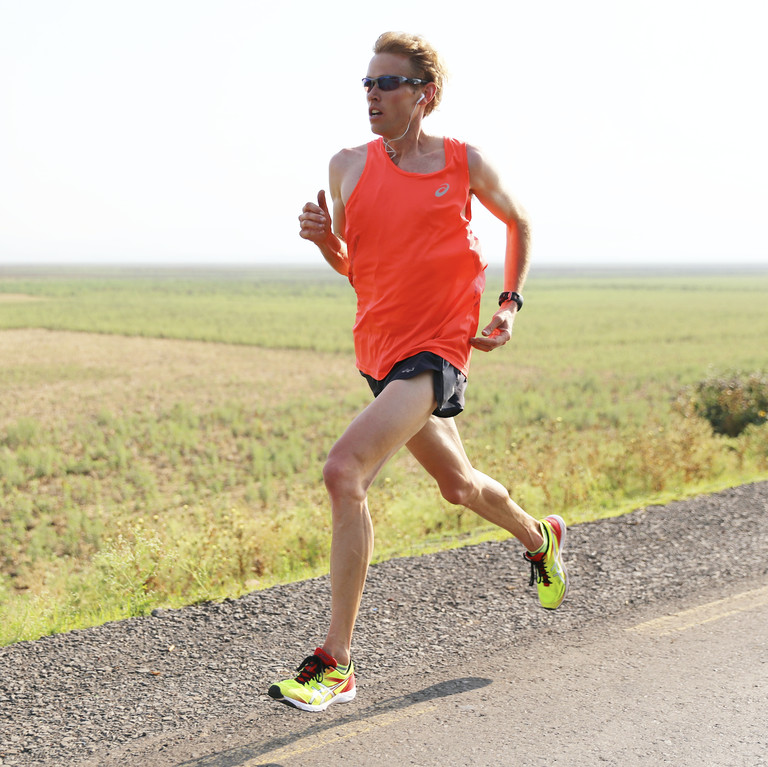
“I’ve always been an all-or-nothing kind of guy,” Hall says in The 41st Day, a new documentary set to debut in New York City on September 28. “When I was little and I decided I wanted to run, I knew I would go all in. But I also knew that a day would come when I would wake up and be done with it.”

The documentary, which was provided to Runner’s World for advanced viewing, follows Hall through his early days as a teenage prodigy in Big Bear Lake, California, his meteoric rise as a cross-country and track athlete at Stanford University, and finally his rollercoaster career as a professional runner. You can watch the movie in select cities throughout October (view the full screening schedule here), and also preorder the DVD, which will be shipped in November.
In the film, Hall is interviewed during pinnacle stages of his career, such as when he set the American half marathon record (59:43) and won the Olympic Marathon Trials in 2007, as well as when he boldly announced in 2010 that he was leaving his coach and turning to God alone for guidance. Throughout the film, we see footage of Hall racing and training, as well as interacting with friends, family, plus his wife—professional marathoner Sara Hall—and their daughters, who all live in Flagstaff, Arizona, today.
(09/27/2019) Views: 1,833 ⚡AMPby Hailey Middlebrook
Sara Hall was the winner at the New York Mini USA 10-K in Central Park
On a morning with near-perfect weather conditions in Central Park, Sara Hall won a thrilling battle for the USATF Women’s 10-K Championship, using a devastating kick to pull away from fellow Flagstaff, Arizona, resident Stephanie Bruce in the final 100 meters. The event was held as part of the 48th edition of the NYRR New York Mini 10-K, the longest-running women’s-only road race in the world.
Five minutes before the open race began, a field of 28 American professionals set out for the national title under comfortable temperatures (68F/20C) with moderate humidity and a slight breeze. Emma Bates, winner of U.S. titles in the marathon and 25-K in the past sixth months, took the early lead as the pack raced up Central Park West for the first mile (5:20), with Jordan Hasay and Carrie Dimoff a step behind.
As the race moved into the park a few minutes later, Bruce inserted herself just behind Bates, while Hall began to move up through the tightly-bunched group.
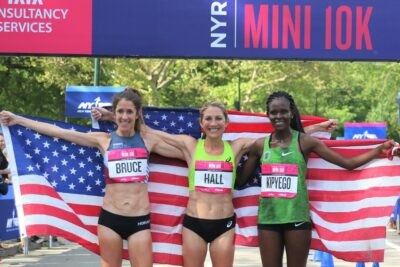
Shortly past 2 miles (10:28), a pack of five began to pull away, including Bates, Bruce, Hall, Aliphine Tuliamuk and Sally Kipyego. Laura Thweatt soon reconnected to the leaders and those six women climbed and descended the steep north hill in the park together through 3 miles (15:34) and 5-K (16:11). In the fourth, uphill mile Bates finally gave up the lead and appeared to be dropping back, with Thweatt and Kipyego taking turns controlling the pace.
“It was an honest pace the whole way. I couldn’t believe how fast we came through 5-K, which is mostly uphill,” Hall told Race Results Weekly. “There was always someone else would get in the lead and start pushing any time it slowed down.”

At the 4-mile mark (21:02) Bates had worked her way back into the mix, with Bruce and Thweatt now leading the group of six. Shortly past 8-K (26:02), the pack passed Sara’s husband and coach, Ryan Hall, cheering on the side of the course.
“I could tell she was relaxed,” the two-time Olympian said. “She smiled at me when she came past me. I was just telling her to collect herself on the downhill. When you’re at that point in the race, everyone is screaming at you and you have to just relax, take a deep breath, collect yourself for the finish.”
Moments later the 36-year-old Hall began a surge to the front, running side-by-side with Bruce, and Kipyego a stride back. With a little more than 400 meters to go, Kipyego lost contact as Bruce and Hall were powering uphill to the finish. At 6 miles (31:25) it was still tight, before Hall unleashed a powerful sprint over the final climb to the tape adjacent to Tavern on the Green (the same iconic finish line as the TCS New York City Marathon).
(06/08/2019) Views: 2,248 ⚡AMPby Richard Sands
New York Mini 10K
Join us for the NYRR New York Mini 10K, a race just for women. This race was made for you! It’s the world’s original women-only road race, founded in 1972 and named for the miniskirt, and it empowers women of all ages and fitness levels to be active and to look and feel great on the run. Every woman who...
more...The US Men's Marathon scene over the last few years was all about one runner Galen Rupp until now, enter Scott Fauble and Jared Ward
The America's men marathon scene over the last few years has not been very impressive not includng some steller performances by one Galen Rupp. There were no sub 2:10 performances (not including Ruff) since Meb keflezighi won the Boston Marathon in 2014 clocking 2:08:37. Things changed on April 15 in Boston.
Former University of Portland cross country and track star Scott Fauble was the top U.S. finisher and placed seventh overall in the 123rd Boston Marathon. Fauble’s time of 2:09:09 is the fastest time from a U.S. runner since 2014 besides Galen 2:06:07 at the 2018 Prague Marathon, 2:06:21 in Chicago the same year and two other sub 2:10 performances.
After the race Soctt Fauble posted, "I don’t have the words to explain yesterday yet. Until those words come, I want to say thank you to so many people, but mostly to Boston. You guys were perfect out there. Thank you."
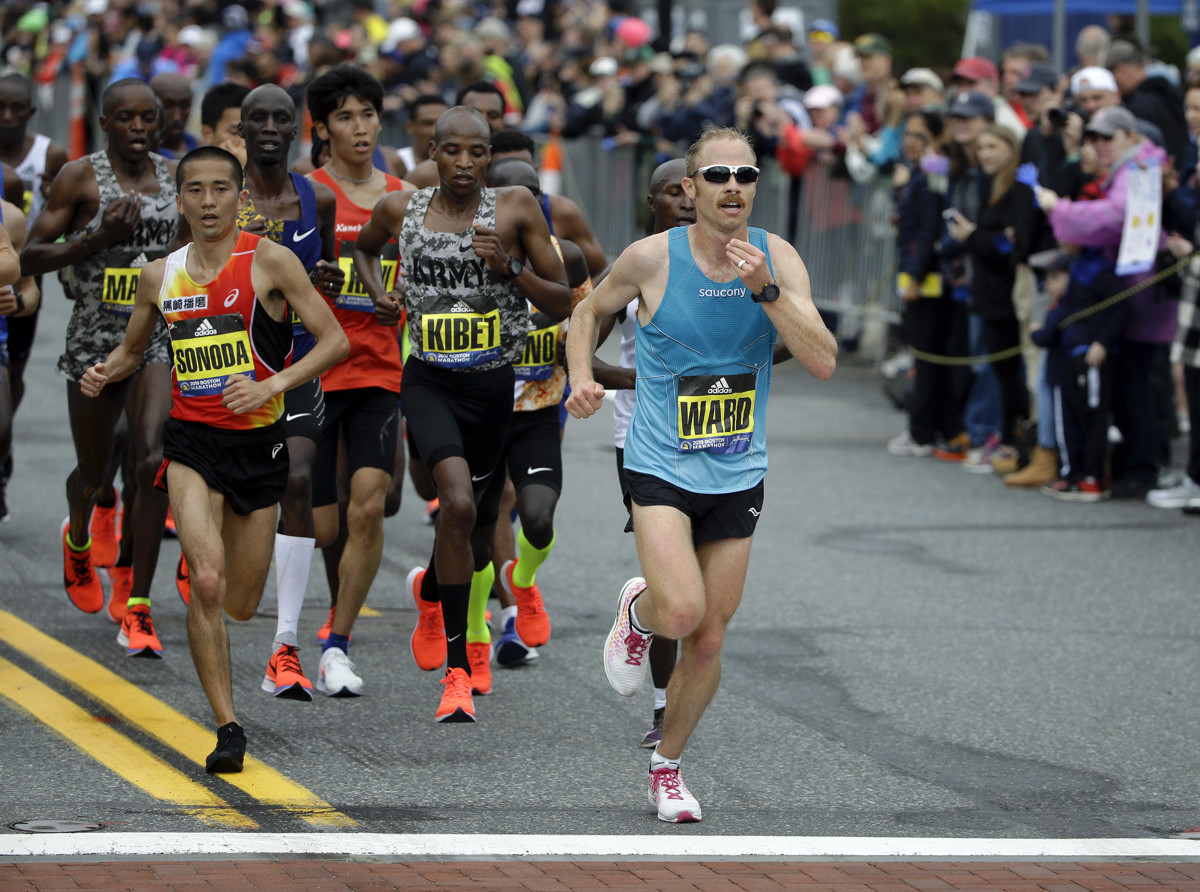
America's 25-year-old Jared Ward too had a steller day clocking 2:09:25 for eighth place. “I’ve been waiting on this 2:09 race for a long time. I think I’ve had it in me a little bit, but conditions today were good enough for running fast,” said Ward, now 30.
Fauble ran the 11th fastest time from a United States born marathon runner in history and the eight fastest time by an American in Boston Marathon history.
“When I was leading, I was thinking, ‘Holy bleep, I can’t believe I’m leading the bleeping Boston Marathon,’” Fauble said. “It was just a surreal experience to be leading a race I grew up watching on TV — not even just growing up, I watched it on TV the last four years and kind of idolized the race and the experience.”
Fauble had a stellar career as a runner for the Pilots. A former University of Portland male student athlete of the year winner, he led the Pilots’ cross country team to a third place finish in 2014, their first ever podium finish. He earned All-American honors for three straight years in cross-country from 2013 to 2015 and earned similar honors in the 10,000 meter race in track.

“Scott’s success surprises nobody,” Portland men’s cross country and track & field head coach Rob Conner said in a press release. “He was always the hardest working guy on our team and he has taken it to a new level as a professional. We are extremely excited for him and proud of his accomplishments.”
A review of the US all-time marathon scene looks like this. In 2011 Ryan Hall clocked 2:04:58 in Boston under perfect conditions and 2:06:07 in 2008 (London). This ranks Ryan Hall 77th on the all-time world list. America's Khalid Khannouchi clocked four times 2:07:04 or under in 2000, 2002 and 2006. Plus Galen's performances noted above.
Is this maybe the beginnings of American men moving up in the rankings?
(04/22/2019) Views: 2,459 ⚡AMPBoston Marathon
Among the nation’s oldest athletic clubs, the B.A.A. was established in 1887, and, in 1896, more than half of the U.S. Olympic Team at the first modern games was composed of B.A.A. club members. The Olympic Games provided the inspiration for the first Boston Marathon, which culminated the B.A.A. Games on April 19, 1897. John J. McDermott emerged from a...
more...John Hancock 2019 Boston Marathon US Elite Open Team
Featured video: 2019 Boston Marathon John Hancock U.S. Elite Open Team for Monday April 15.
Abdi Abdirahman, a four-time Olympian, placed sixth at the 2017 Boston Marathon. He is a multiple national champion in the 10,000m, 10K, 10-mile and half marathon.
Shadrack Biwott finished third this year in Boston. Last year, he was second American and fourth overall. Biwott placed fifth at the 2016 TCS New York City Marathon in a personal best time of 2:12:01.

Aaron Braun, 13th at the 2018 Bank of America Chicago Marathon, is a versatile road runner. Braun is a national champion in the 12K and was top American at the 2015 Houston Marathon.
Sarah Crouch has finished top-ten three times at the Bank of America Chicago Marathon, including this year where she was top American and ninth overall. She is a past champion of the Tallahassee Marathon and finished 11th at the 2016 Boston Marathon.
Jeffrey Eggleston has raced on three IAAF World Championships Marathon teams, placing as high as 13th in 2018. He has won the Pittsburgh, Woodlands, Lima and San Diego Marathons and has been runner-up in Brisbane, Pittsburgh and at Twin Cities.
Scott Fauble was the second American and seventh overall at the 2018 TCS New York City Marathon. Fauble placed fourth in the 10,000m at the 2016 Olympic Trials and represented the United States at the 2017 IAAF World Cross Country Championships.
Lindsay Flanagan, the 2015 Pan American silver medalist in the marathon, finished 11th at the 2017 Boston Marathon and set her personal best of 2:29:25 at the Frankfurt Marathon this year.
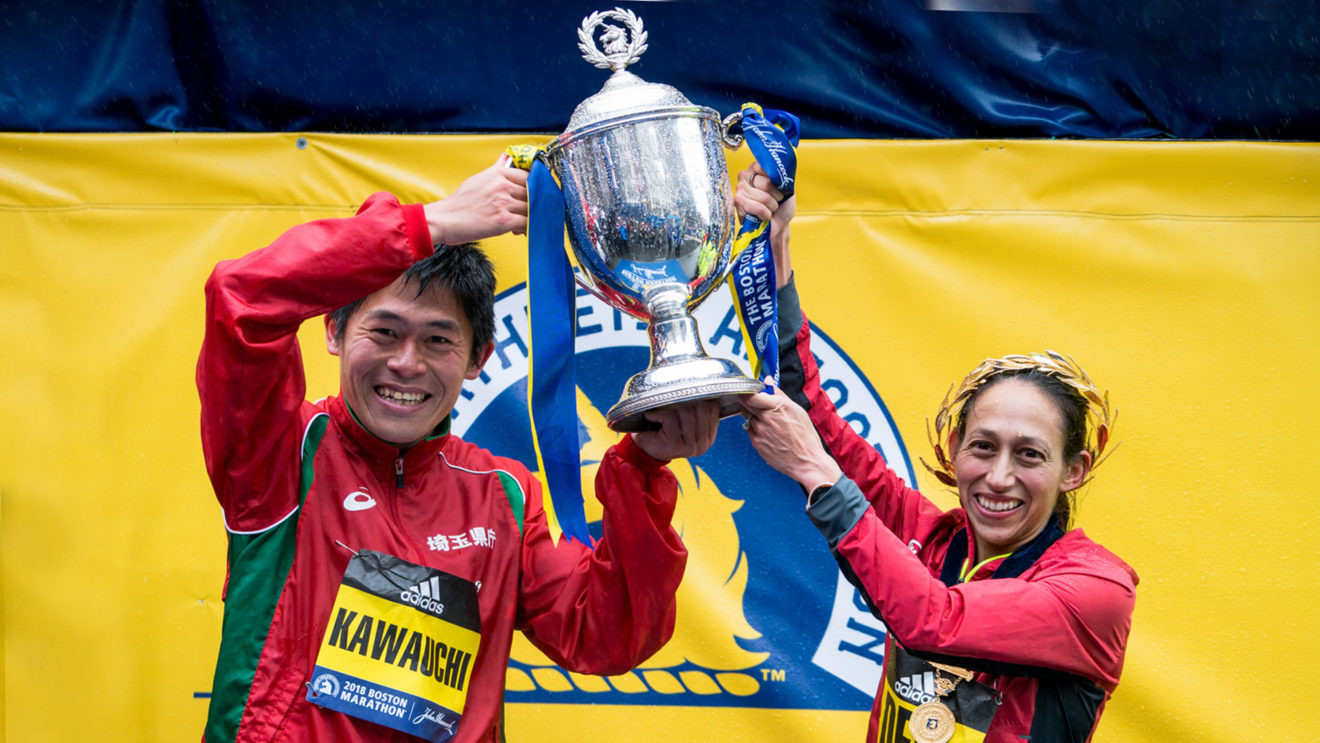
Sara Hall is the tenth fastest U.S. women’s marathoner of all time having set her 2:26:20 mark at the 2018 Ottawa Marathon. Hall has earned national titles in the marathon, 20K, 10-mile, mile and cross country. She is married to Ryan Hall, who is a John Hancock Elite Athlete Ambassador and holds the American course record of 2:04:58 at the Boston Marathon.
Jordan Hasay set an American debut record of 2:23:00 with her third-place finish in Boston in 2017. She then ran the second fastest marathon of all time by a U.S. woman at the 2018 Bank of America Chicago Marathon, where she placed third in 2:20:57. Hasay is an 18-time All American and a national champion at 15K and 20K.
Elkanah Kibet, a member of the U.S. Army World Class Athlete Program, has had two top-ten finishes at the Bank of America Chicago Marathon. At the 2017 IAAF World Championships Marathon, Kibet finished top American and 16th overall. He was 8th in Boston in 2018.
Desiree Linden, a two-time Olympian, returns to Boston as defending champion. A top-five finisher in eight Abbott World Marathon Majors, additional accomplishments include placing seventh at the 2016 Olympic Games Marathon, tenth at the 2009 IAAF World Championships Marathon, second at the 2012 and 2016 U.S. Olympic Marathon Trials and second in the 10,000m at the 2015 Pan American Games. In addition to her 2018 win in Boston, she placed second in 2011.
Timothy Ritchie, the 2017 U.S. National Marathon champion, ran for the U.S. at the 2016 IAAF World Half Marathon Championships where he placed 23th. Ritchie is the head men’s cross country coach at the University of Massachusetts, Amherst.
Dathan Ritzenhein is the fourth fastest U.S. marathoner of all time with a 2:07:47 personal best. Career highlights for the three-time Olympian include finishing ninth at the 2008 Olympic Marathon, winning the bronze medal at the 2009 IAAF World Half Marathon Championships and finishing 13th at the 2012 Olympic Games 10,000m.
Sarah Sellers ran through freezing rain and torrential wind this year to finish second behind Des Linden. In her 2017 marathon debut, Sellers won the Huntsville Marathon. In New York this year she finished 18th.
Brian Shrader is a versatile runner on the track and roads. He made his half marathon debut in Boston this year at the B.A.A. Half Marathon, running 1:05:26. He also made his marathon debut in 2018, running 2:13:31 at the USA Championships in Sacramento.
Becky Wade, a champion of the California International Marathon, finished 11th at the 2018 Virgin Money London Marathon and tenth at the 2017 Bank of America Chicago Marathon.
Jared Ward placed third at the 2016 U.S. Olympic Marathon Trials and followed with a sixth-place finish at the Olympic Marathon in Rio de Janeiro, less than a minute and a half out of medal contention. In 2017 Ward was tenth at the Boston Marathon and this year, he finished top American and sixth overall at the TCS New York City Marathon.
(04/10/2019) Views: 2,247 ⚡AMPBoston Marathon
Among the nation’s oldest athletic clubs, the B.A.A. was established in 1887, and, in 1896, more than half of the U.S. Olympic Team at the first modern games was composed of B.A.A. club members. The Olympic Games provided the inspiration for the first Boston Marathon, which culminated the B.A.A. Games on April 19, 1897. John J. McDermott emerged from a...
more...John Hancock today announced its Elite Athlete Ambassador Team for the 2019 Boston Marathon
Boston Marathon champions Meb Keflezighi, Tatyana McFadden, Bill Rodgers, Joan Benoit Samuelson, Greg Meyer and Uta Pippig will join Shalane Flanagan, Ryan Hall, Deena Kastor, Becca Pizzi and Team Hoyt as ambassadors for this year’s race.

“As Patriots’ Day nears, we welcome our 2019 Elite Ambassador Team for the Boston Marathon,” said John Hancock Chief Marketing Officer Barbara Goose.

“Through their mentorship and inclusiveness, these accomplished athletes inspire runners of all ages and abilities during race week and throughout the year at John Hancock sponsored events.
The team has become an integral part of our community.”
Ambassadors will cheer on the 30,000 participants racing from Hopkinton to Boston on Patriots’ Day and attend media, community and race week events, including making appearances at the Runner’s Seminar at the Expo, surprise “meet and greets” near the finish line, and at the John Hancock Elite Athlete press conference on April 12 at 10 a.m. at the Fairmont Copley.
(03/28/2019) Views: 1,906 ⚡AMPBoston Marathon
Among the nation’s oldest athletic clubs, the B.A.A. was established in 1887, and, in 1896, more than half of the U.S. Olympic Team at the first modern games was composed of B.A.A. club members. The Olympic Games provided the inspiration for the first Boston Marathon, which culminated the B.A.A. Games on April 19, 1897. John J. McDermott emerged from a...
more...Meb Keflezighi became the first American male to win the Boston Marathon in 31 years in 2014
Two nights before the 2014 Boston Marathon, I was walking from the Harvard Club with race director Dave McGillivray after a meeting with the Martin Richard Foundation.
Dave asked me, “What’s your goal for Monday?” I said, “To win. I’m going to go for it.”
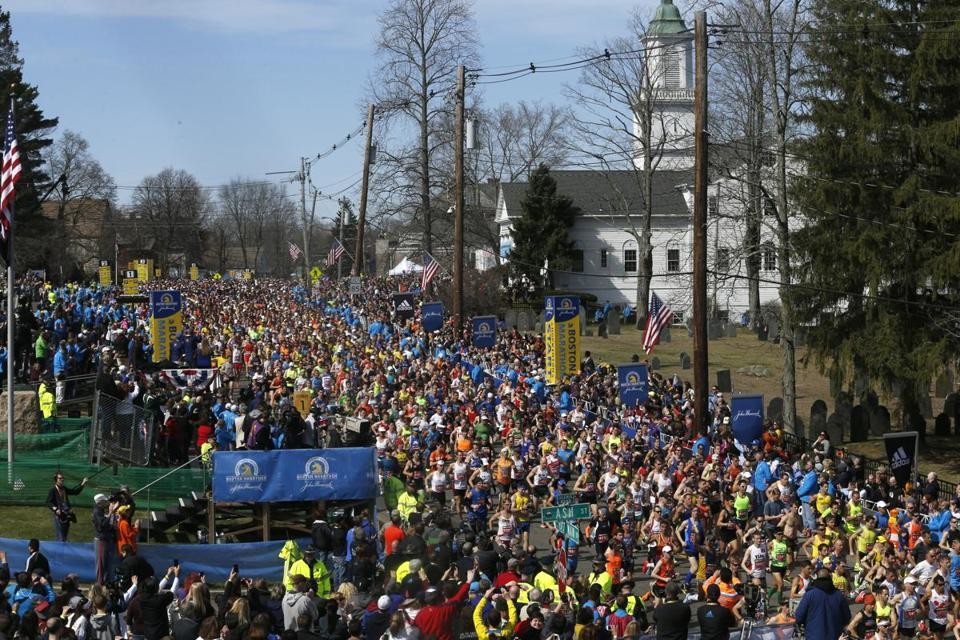
Of course I always ran to win, in the sense of getting the best out of myself on race day. But this time was different — I meant it literally.
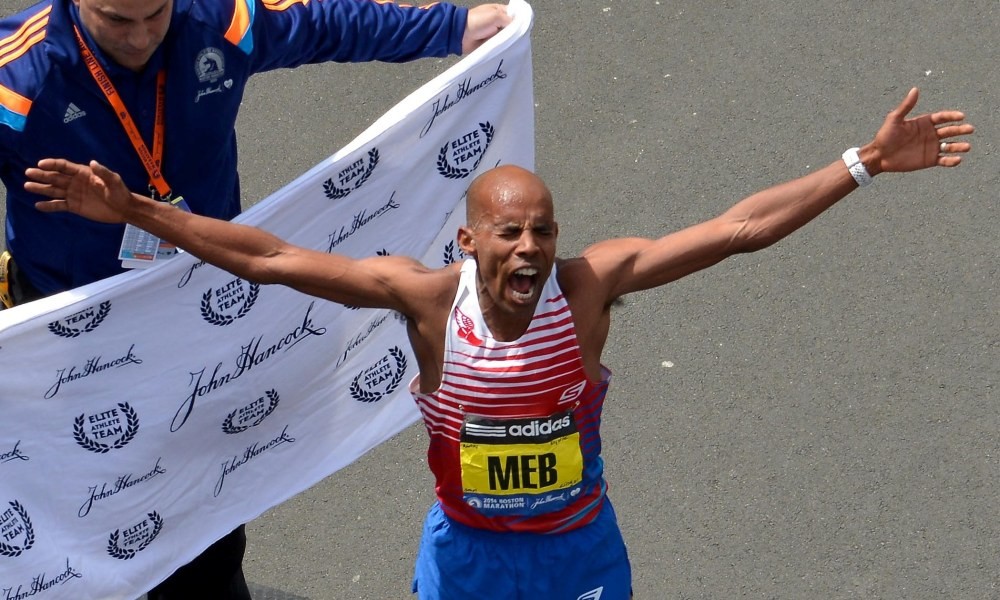
Boston 2014 was a special focus long before I broke the tape on Boylston Street.
I had watched the 2013 Boston Marathon from a grandstand by the finish with my good friend from San Diego, Rob Hill. Injury had scuttled my plan to be there as a competitor.
While I would have liked to be racing, watching thousands of runners finish amid the palpable positive energy was a great experience. I was taking photos and notes on the positive humanity and camaraderie the marathon embraces. It had been 30 years since an American man won Boston.
As soon as Lelisa Desisa of Ethiopia broke the tape in 2:10:22, I texted my friend and fellow US Olympian Ryan Hall, who also missed the race because of injury. “WE CAN DO THIS,” I wrote. Ryan texted back almost immediately, “We’ll get after it.” Already fired up for 2014, I left the stands.
(03/04/2019) Views: 1,730 ⚡AMPby Meb Keflezighi
Boston Marathon
Among the nation’s oldest athletic clubs, the B.A.A. was established in 1887, and, in 1896, more than half of the U.S. Olympic Team at the first modern games was composed of B.A.A. club members. The Olympic Games provided the inspiration for the first Boston Marathon, which culminated the B.A.A. Games on April 19, 1897. John J. McDermott emerged from a...
more...Galen Rupp was selected as USATF Athlete of the Week after winning the Prague Marathon clocking 2:06:07
Galen Rupp, the bronze medalist at the 2016 Olympic Games, ran 2:06:07 to win the Prague Marathon May 6 by almost a minute over Sisay Lemma of Ethiopia.
He sliced more than three minutes off his previous lifetime best of 2:09:20, set in winning Chicago last year. His time ranks him second only behind American record-holder Khalid Khannouchi, who ran 2:05:38 in 2002, on the U.S. all-time list. (Not including Ryan Hall’s time on the point-to-point Boston course.)
Rupp has never placed lower than third in any of the five marathons he has finished. He has also improved his PR on each marathon he has finished. Rupp (Portland, Oregon) won the Prague Marathon and became the second-fastest U.S. man ever in the event to earn USATF Athlete of the Week.
Now in its 17th year, USATF’s Athlete of the Week program is designed to recognize outstanding performers at all levels of the sport.
(05/11/2018) Views: 2,259 ⚡AMPGalen Rupp smashed his PR and won the Prague Marathon by nearly a minute clocking 2:06:07
American’s Galen Rupp did as promised and the weather did not get in his way at the 24th Annual Volkswagen Prague Marathon Sunday morning May 6.
He ran an even pace the whole way reaching the half way point in 1:03:02. Ethiopian’s Sisay Lemma stayed close through 30k but Galen took control and clocked 1:03:05 for his second half finishing in 1:06:07.
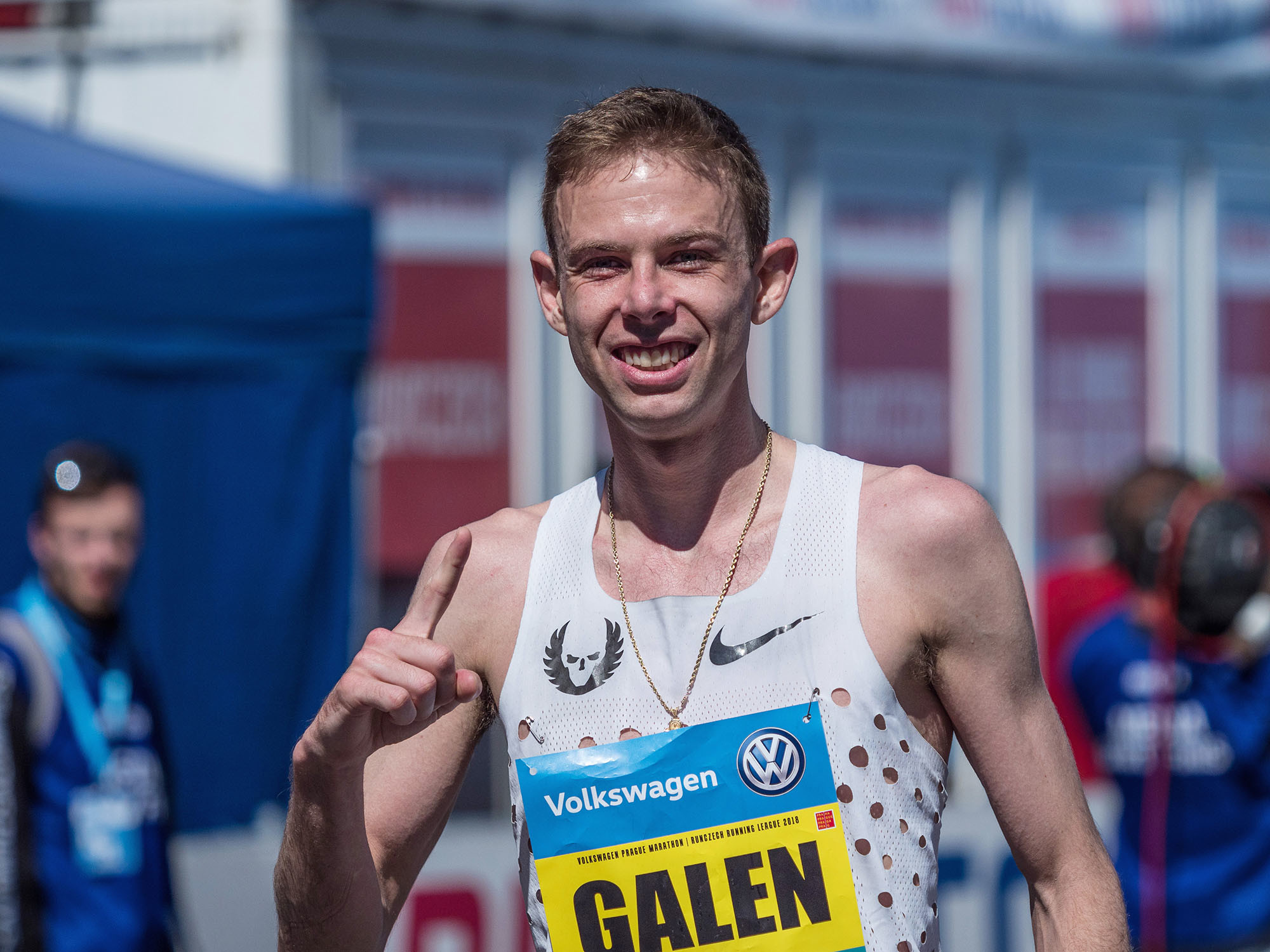
This smashed his previous best by three minutes and 13 seconds. This makes Galen the third fastest American ever and his time was only 29 seconds off the official American Record held by Khalid Khannouchi.
Ryan Hall’s 2:04:58 clocked in Boston is not considered official since Boston is a point-to-point course. Galen has now finished five marathons setting a PR each time. The Prague Marathon kicked off at 9am local time from the Old Town Square.
Sisay finished second clocking 2:07:02. Thousands of runners from all over the world enjoyed the perfect weather and the beautiful course.
(05/06/2018) Views: 5,216 ⚡AMPby Bob Anderson
Galen Rupp runs first sub 60 to win 44th annual Roma Ostia Half Marathon
Galen Rupp ran a personal best to win the 44th edition of the Roma-Ostia Half Marathon on Sunday (March 11, 2018).
The US distance runner won the Rome race in 59:47 as he went sub 60 minutes for the first time and takes 43 seconds off his 2011 best.
He had Ryan Hall’s 2007 US record in his sights and came very close only missing Hall’s time by four seconds.
However, if he had dipped under the 59:43 mark it would not have stood as an American record however because the course is a point to point race and not record-eligible....
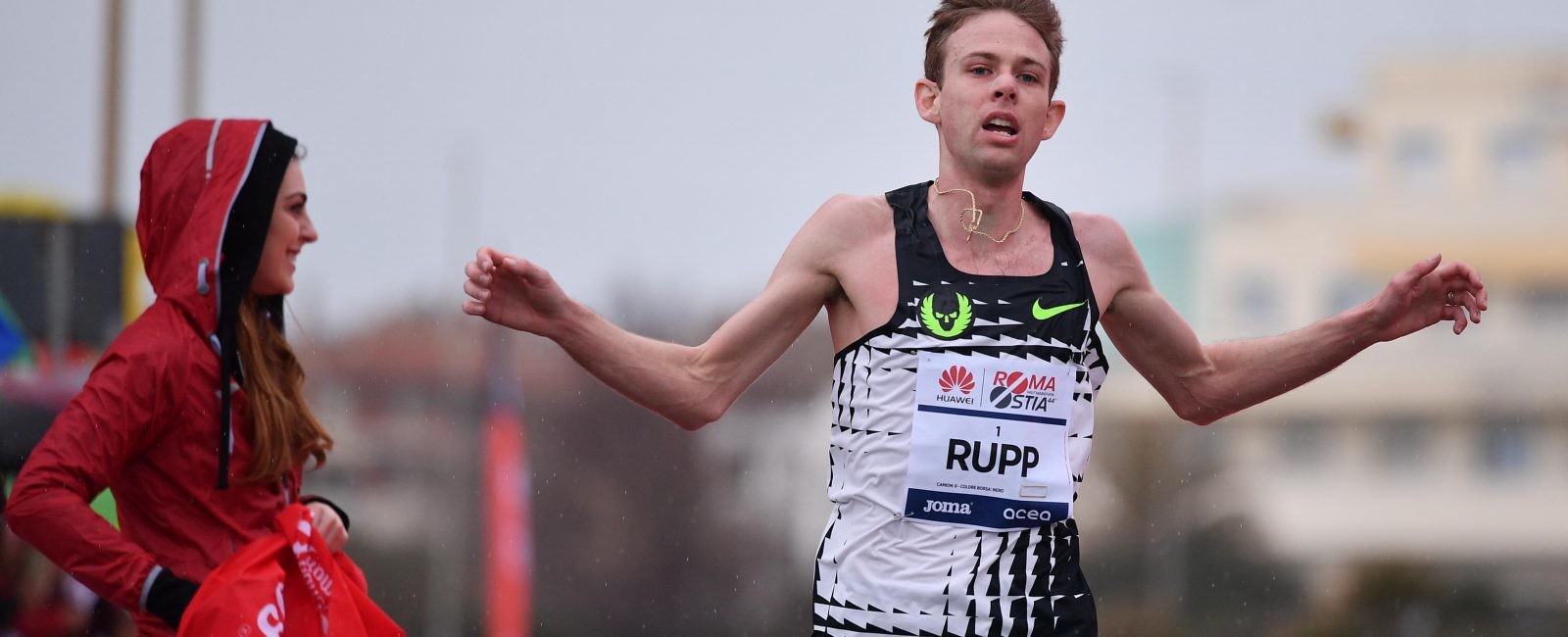
Rupp launched his decisive attack between 15th and 16th kilometers when, after a tactic of waiting during which he vented his most credited opponents, he lengthened the pace by breaking the Kenyans Moses Kemei, second place in 1:00:44, and Justus Kangogo, third in 1:01:02....
The female race saw Ethiopian’s Hftamenesh Haylu in first with 1:09.02 and compatriot Dera Datta close behind in 1:09:21. Third place went to Kenya’s Rebecca Chesir, who finished in 1:11:04.
(03/11/2018) Views: 5,681 ⚡AMPGalen Rupp is going to be racing half marathon on Sunday in Italy
The IAAF has confirmed that "Galen Rupp will be in the spotlight at the 44th edition of the Huawei Roma-Ostia Half Marathon, an IAAF Gold Label road race, on Sunday March 11 in Rome, Italy."
“I am very happy to run in Rome, I have heard great things about this race,” Rupp said. “My goal is to run a fast time in my preparation for the Boston Marathon.”
“I like the Roma-Ostia course as it is flat and it will give me the chance to fulfill my potential. I think it will be a high-level race, where I will run to win. I am aiming to run my personal best. If I am fit I can attack the US record.”
That mark in 59:43, set by Ryan Hall in Houston in 2007. Rupp’s lifetime best in 1:00:30 set in 2011. However, since this is a point to point course it would not count as an official American Record.
(03/09/2018) Views: 2,974 ⚡AMP




